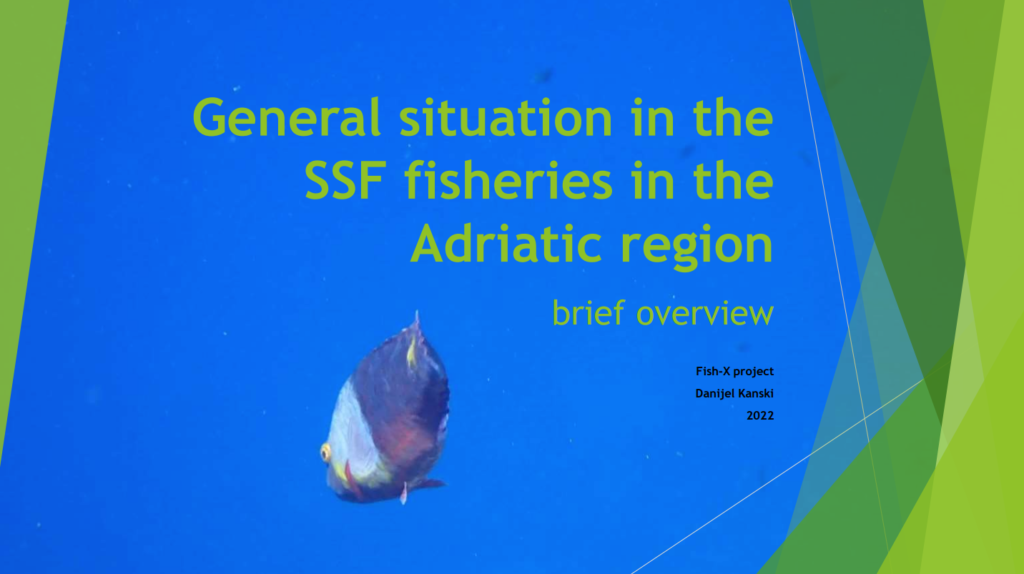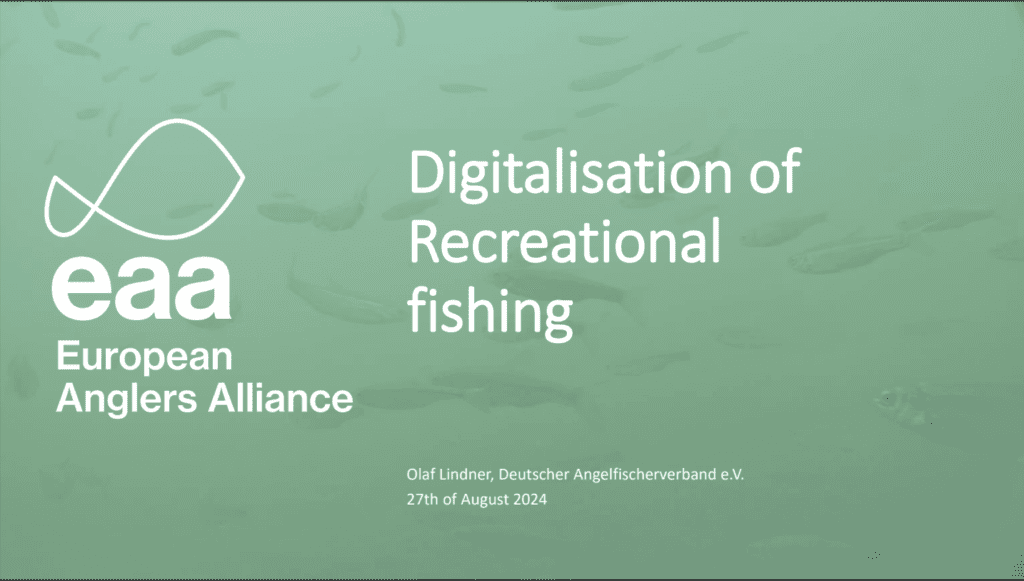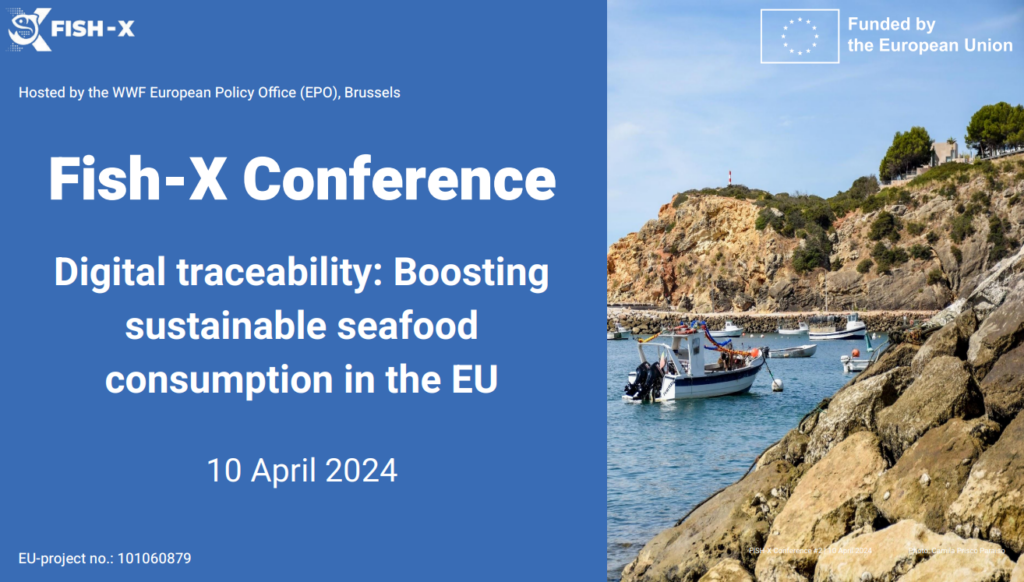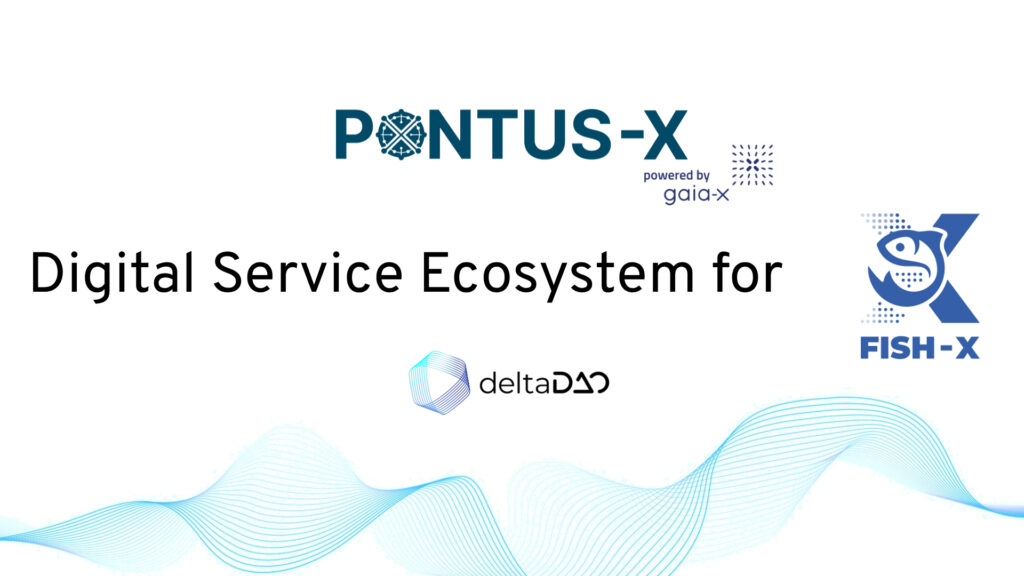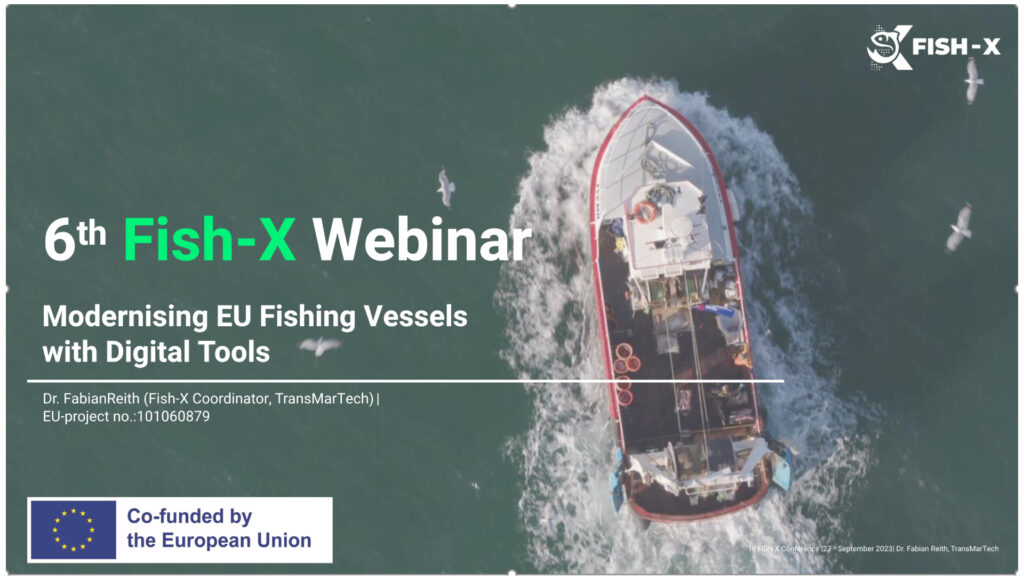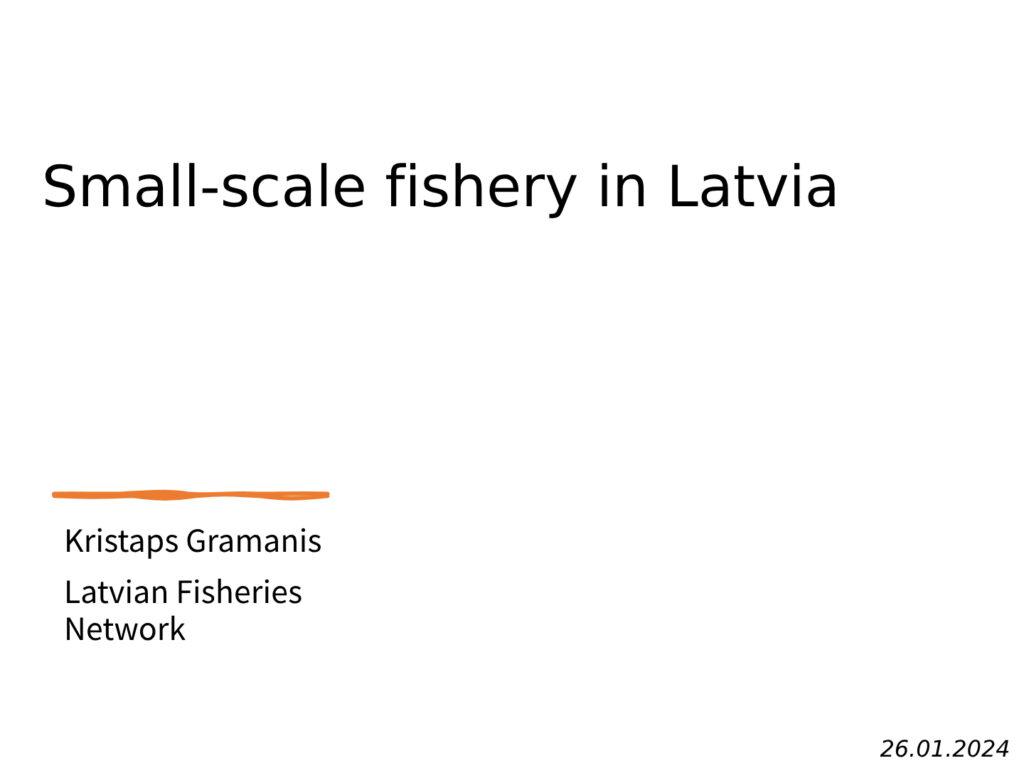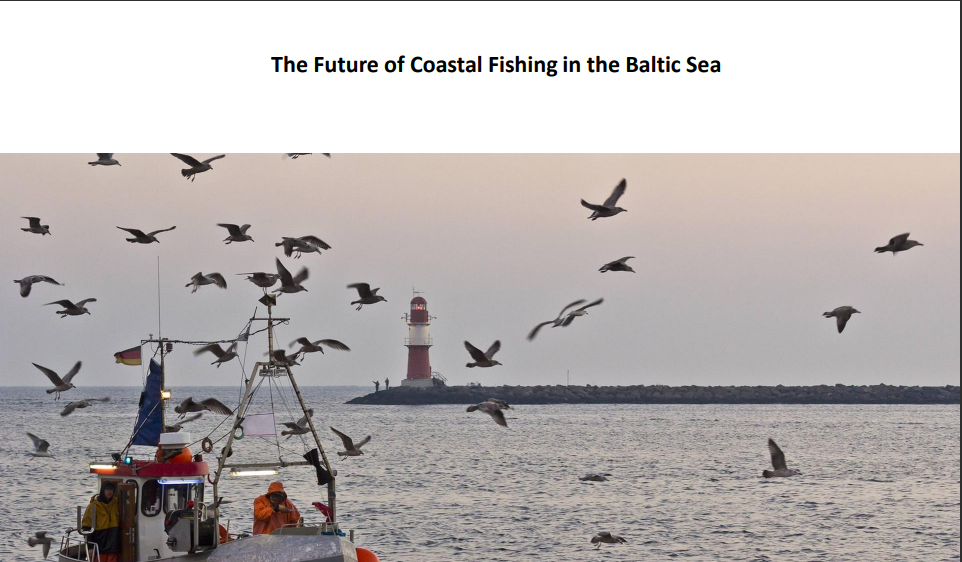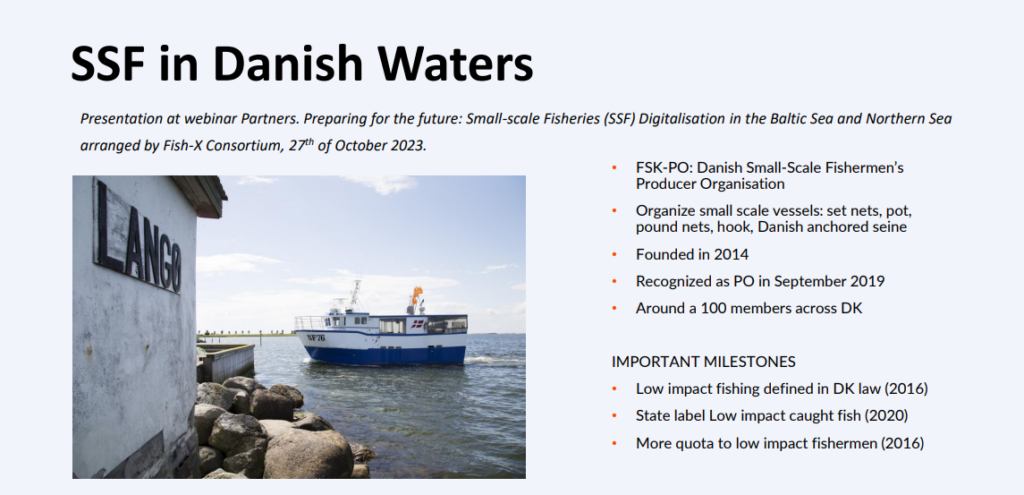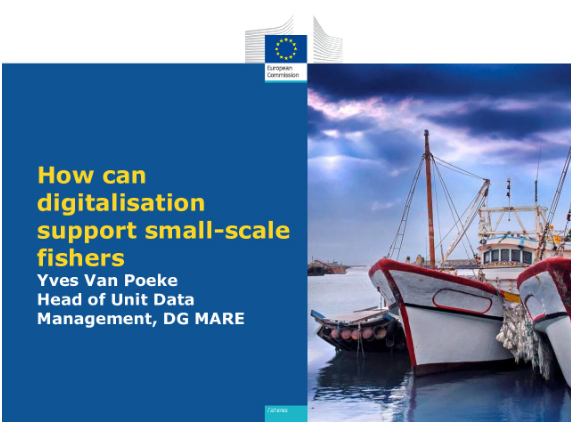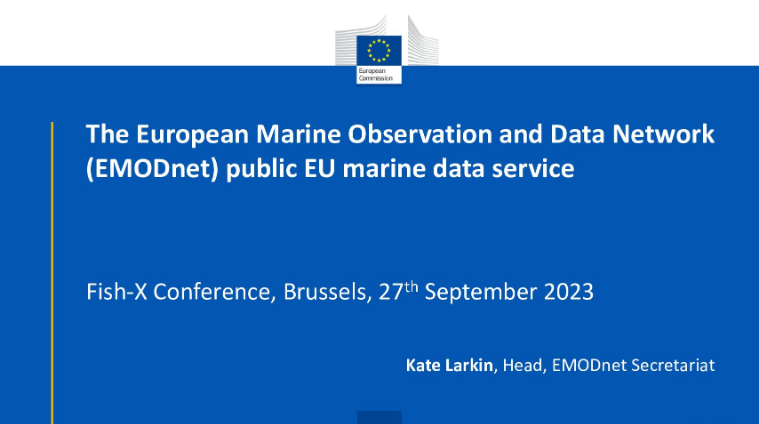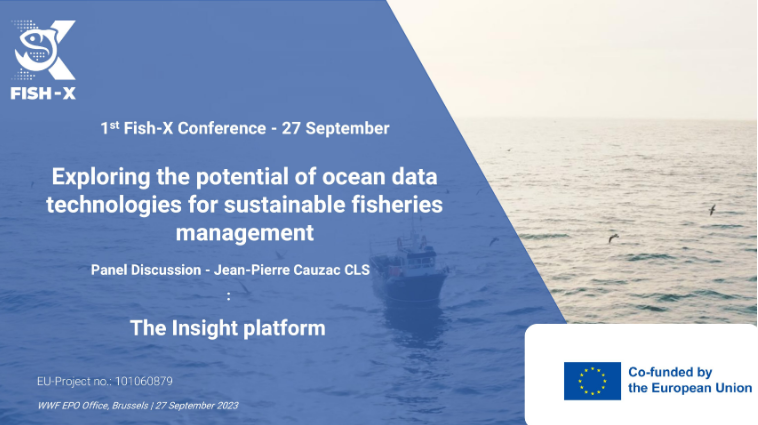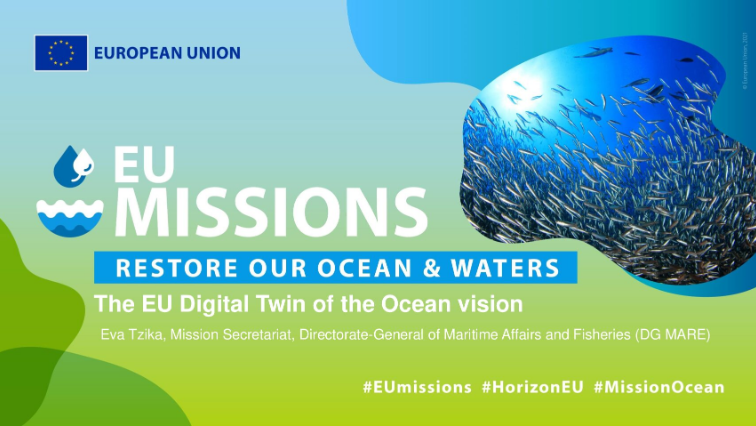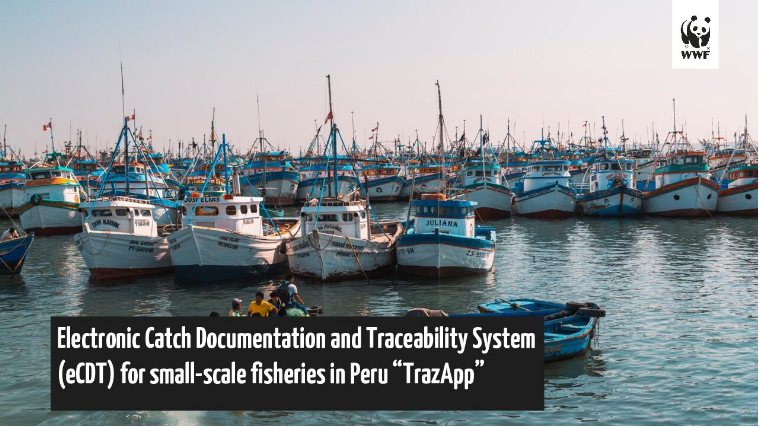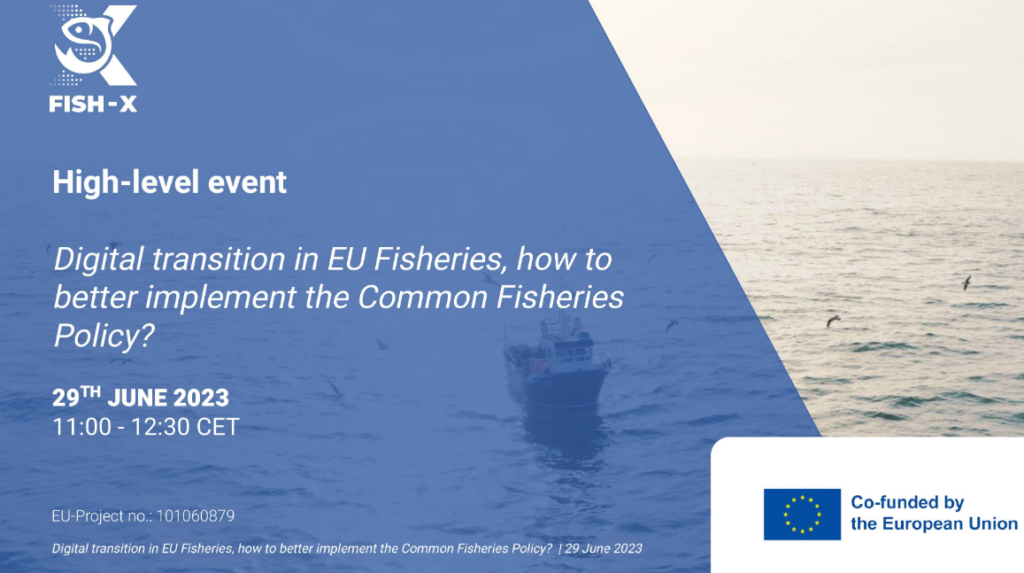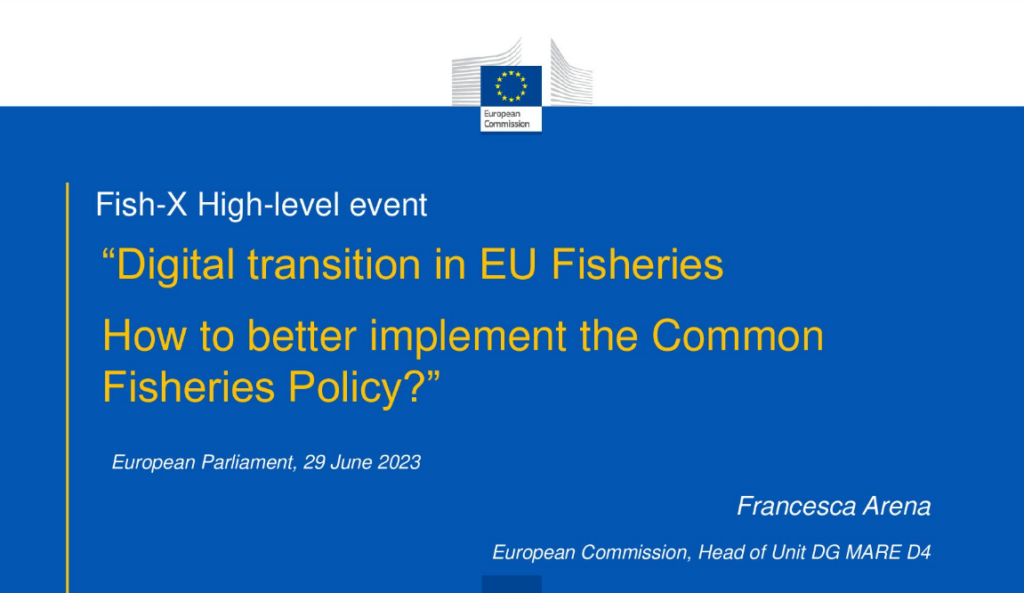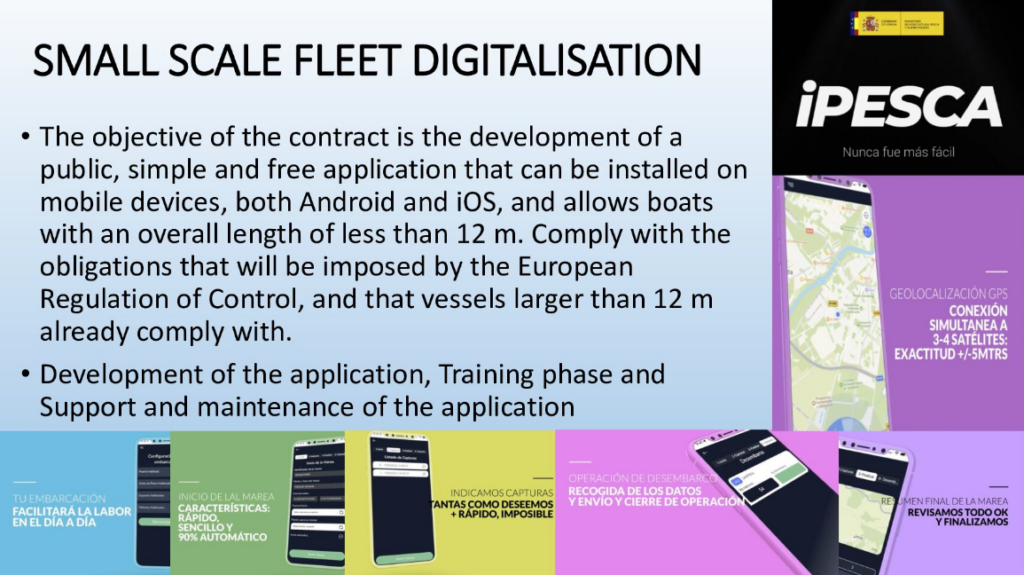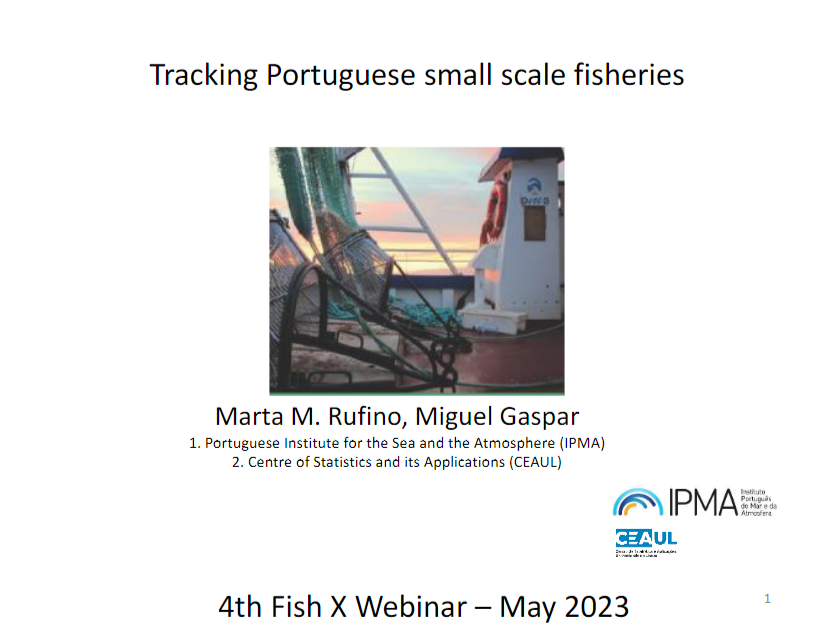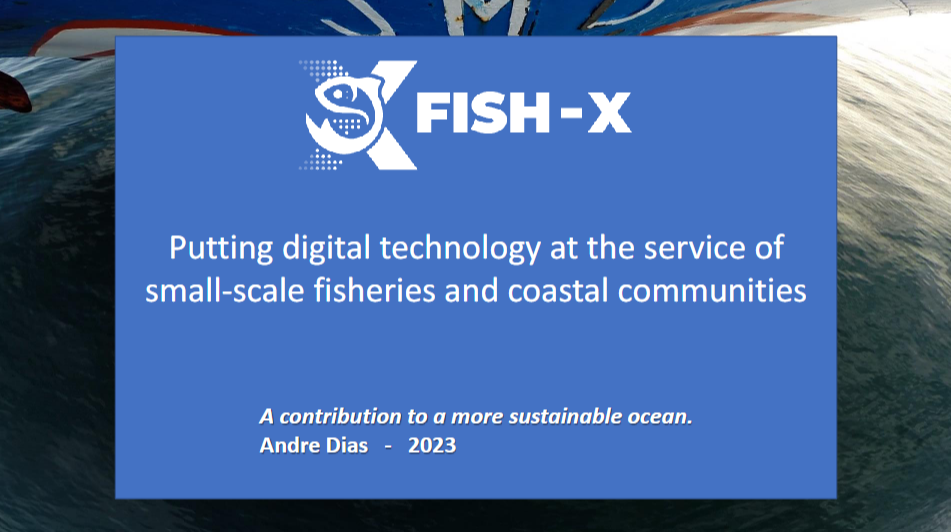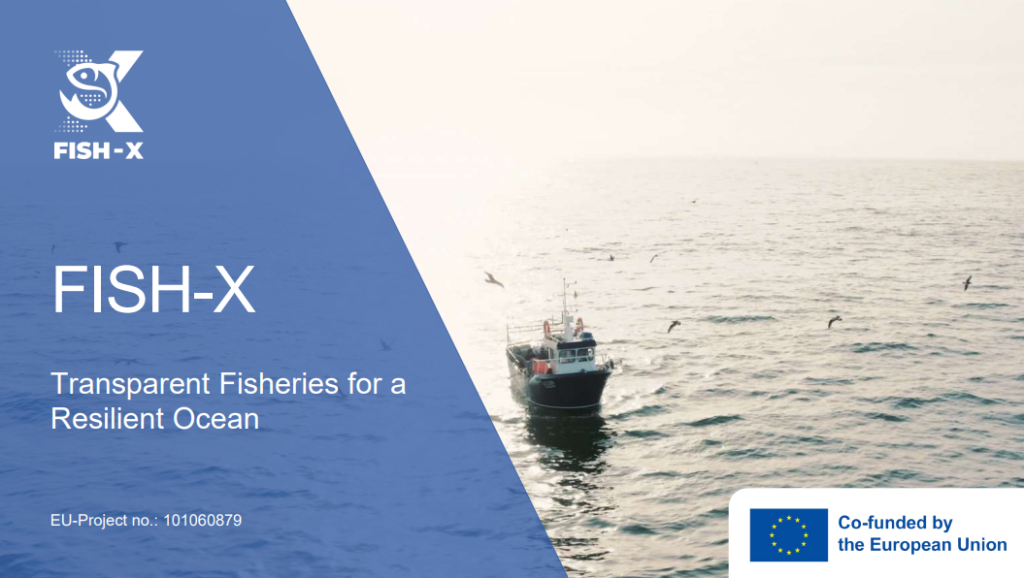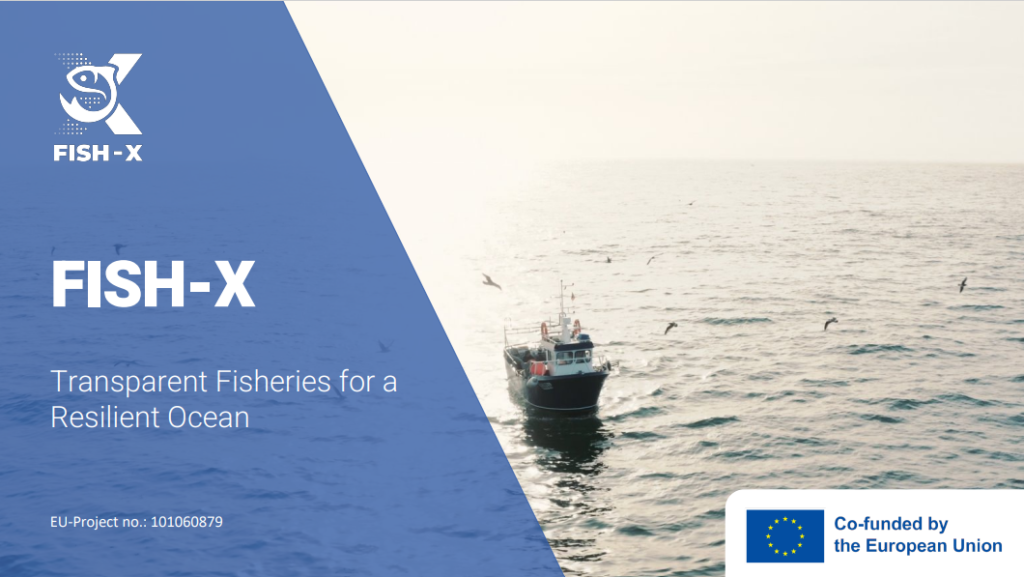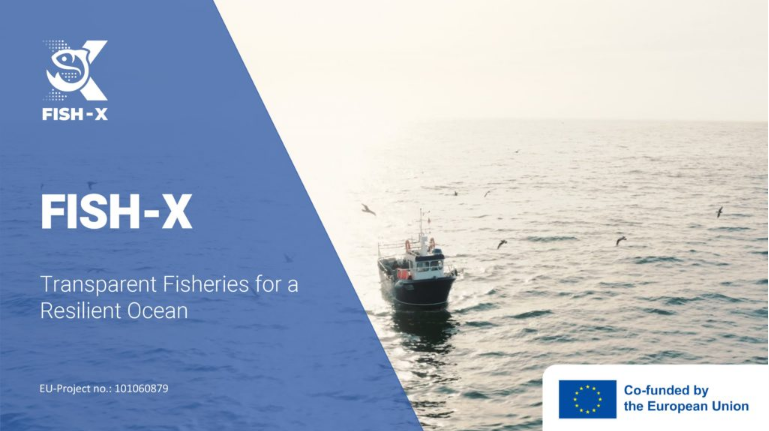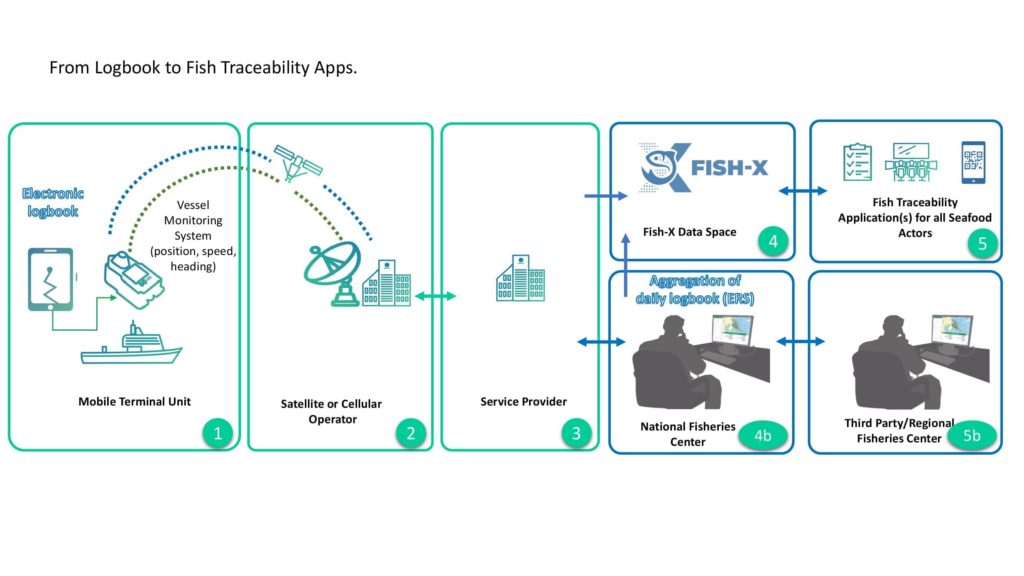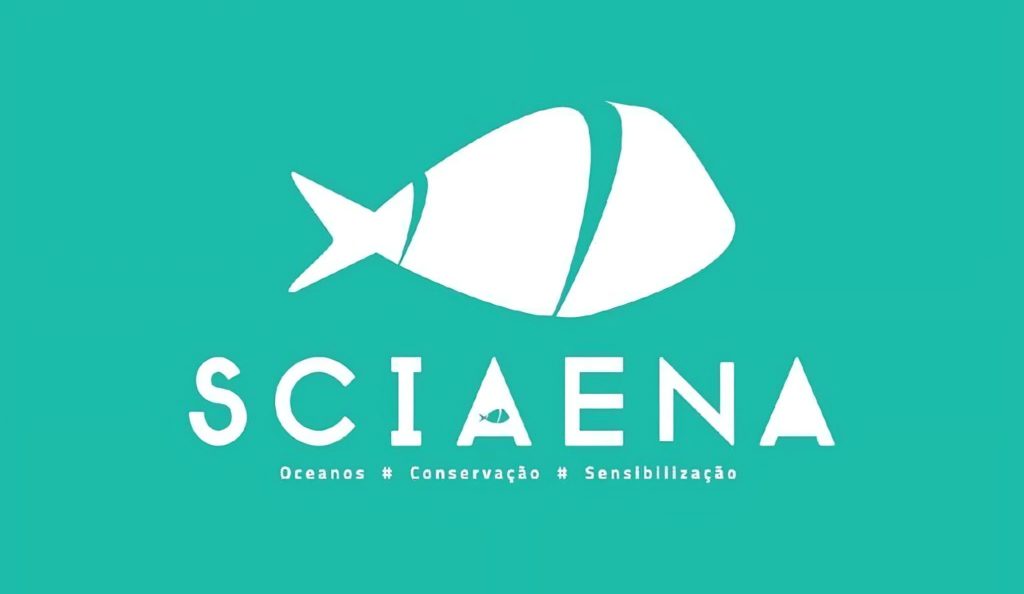Fish-X Virtual Events
A joint effort to develop a synergetic framework, emphasizing transparency & traceability, for a better future at sea.
Our events include:
- Webinars
- Working Group Meetings
- Conferences
- Workshops
- Virtual Exhibitions
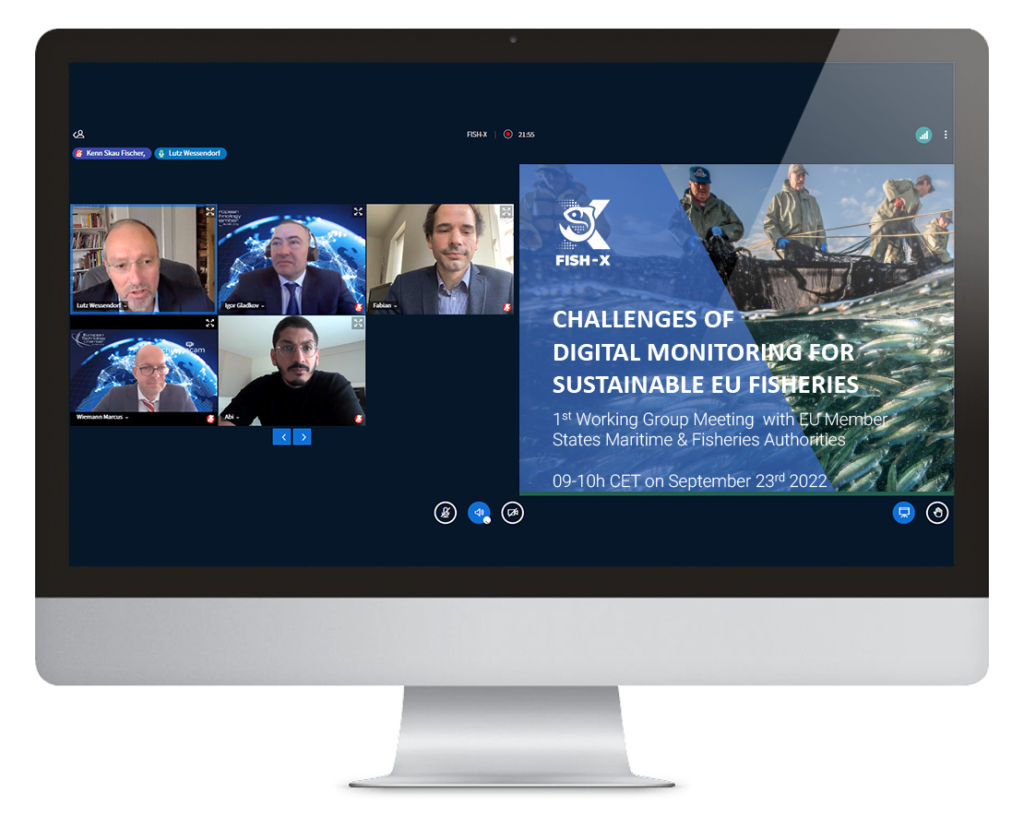
Upcoming Events
Fish-X Closing Conference and Expo scheduled for 18 March 2025.
Fish-X Conference + Expo - Fish-X Roadmap 2030: Strategies for Good Dissemination of Digital Technologies to EU Fisheries

The Fish-X Conference + Expo will present the Fish-X Roadmap for Digital Transformation of EU Fisheries until 2030 and present the digitial tools developed by Fish-X. To gain the highest impact from these tools will it be key to formulate an actionable milestone plan for effective dissemination and exploitation, that is commonly elaborated and agreed by the affected sectors and stakeholders.
The objective of this conference is to support the effective implementation of the revised EU Fisheries Control Regulation and of the EU Common Market Organisation (CMO) Regulation. Via this event, Fish-X will:
- Present its Roadmap for Digital Transformation of EU Fisheries until 2030
- Collect feedback to prepare Strategies for Good Dissemination of Digital Technologies to EU Fisheries
- Demonstrate the project’s core components: Fish-X Dataspace & Insight Platform
- Offer opportunities to get in touch with Fish-X partners online via expo booths. Meetings for this can be requested and booked in advance
Past Events
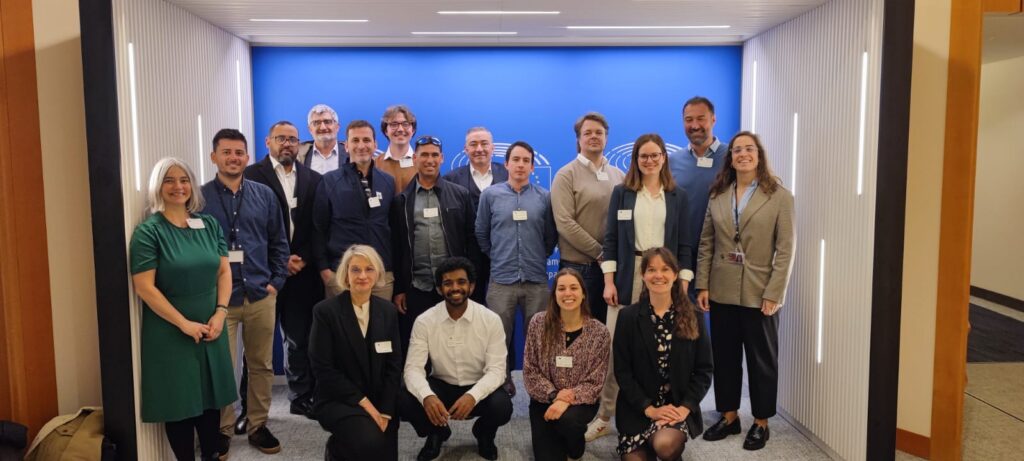
Fish-X High-level event at the EU Parliament & General Assembly April 2025
The final Fish-X General Assembly and the high-level event were held at the WWF European Policy Office and the EU Parliament from the 22nd & 23rd or April 2025 in Brussels. The General Assembly intended to coordinate the final steps that needed to be taken for the last two months of the project, allowing for on-sight discussion to address any remaining open questions concerning the final reporting period and post-project activities amongst others.
WWF welcomed the consortium partners on the first day in their Brussels offices for a co-working session before the project lead, TMT began with their introduction to the first day of the General Assembly, where it summarized the projects accomplishments and advances since the last assembly in June 2024. These included the further developments of the Traceability Platform, Data Space and Traceability Application and the successful execution of all webinars and workshops.
The meeting continued with WWF EPO’s Laure Guillevic, who had led the preparations for the High-level event to be held at the European Parliament the following day, going through the main presentation and discussion points at the parliament. The first day ended with a get together at a local restaurant.
The second day saw the consortium partners meet in front of the European Parliament, together with fishers Marko Kožul from Croatia and Nelson Caracol from Portugal, who were to speak in front of EU representatives during the event. After the short greetings did the consortium proceed with its project presentation “Small-scale fisheries turning digital: how to do it right?” which was co-hosted by European Parliament members Željana Zovko (EPP, Croatia) and Stéphanie Yon-Courtin (Renew, France). The event concluded with a Q&A session and a brief post-event discussion and shortly after the final day of the General Assembly began back at the premises of WWF.
Amongst the topics discussed during the last General Assembly were the final reporting steps needed to be taken concerning exploitation and post project scalability of the Fish-X digital tools and the project findings. Thus, did the high-level event and the final GA of the Fish-X project come to an end after one final dinner.
Fish-X Roadmap 2030: Strategies for Good Dissemination of Digital Technologies to EU Fisheries
Panel 1: Strengthening Digital Monitoring and Compliance:
Keynote: Hans Polet (Flanders Research Institute for Agriculture Fisheries & Food)
Irina Davidjuka (Fisheries Economist)
Jacob Handrup (Chef Consultant Danmarks Fiskeriforening PO)
Ana-Rita Garcia Ferreira (Upwelling -Blue Innovation)
Panel 2: The Used Cases of Fish-X: Implementation of digital tools with SSF and what can be discerned from it?
Keynote: Hjrove Čeprnja (Project Officer Fisheries and Aquaculture, WWF)
Seamus Bonner (Secretary of IIMRO)
Raquel Pereira (Fisheries Officer, Sciaena)
Panel 3: Collaborative Governance for digital oceans
Keynote: Pedro Valadas Monteiro (VP CCDR Algarve)
Marija Polak (UNIDO)
Martin van Brakel (COLEAD)
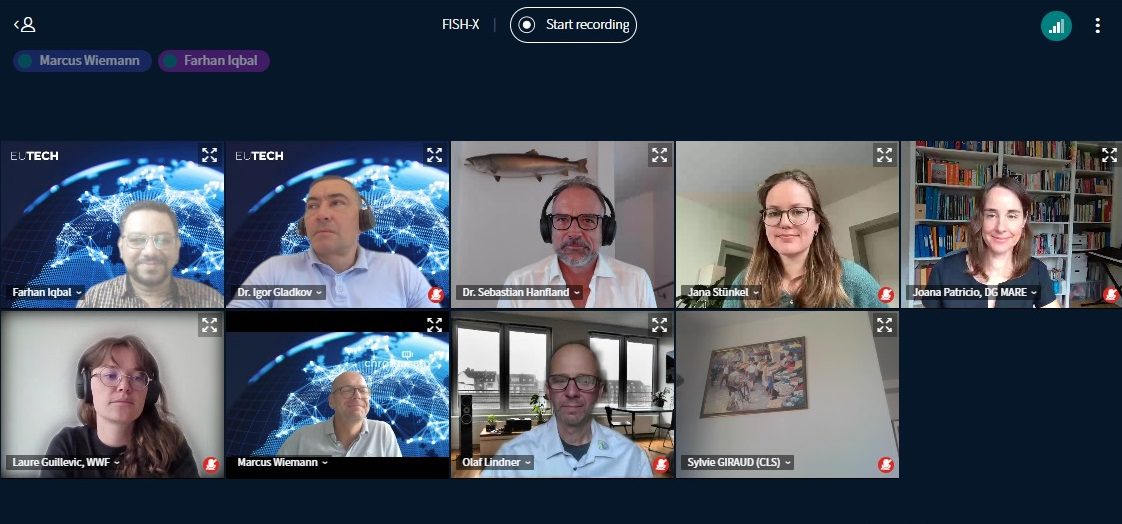
Digitalisation of Recreational Fisheries and Compliance with EU Legislation
The 7th webinar of the Fish-X project was held on 30th August 2024, on the topic of ‘Digitalisation of Recreational Fisheries and Compliance with EU Legislation’. The number of participants was around 100.
The webinar focused on recreational fisheries which is also addressed by the EU’s new Fisheries Control Regulation under Article 55. In order to enhance the management of fishing activities, the regulation aim to ensure that EU fisheries control and monitoring systems stay up-to-date with the latest technological developments.
Marcus Wiemann, Fish-X Coordinator from EUTECH, along with Laure Guillevic, Ocean Policy Officer from WWF EPO, moderated the webinar. EUTECH, in collaboration with consortium partners, organises a series of webinars aimed at engaging key stakeholders. The purpose of these webinars is to encourage contributions to the project’s strategic vision and support the roadmap for digital transition.
Jana Stünkel, Fish-X Coordinator from TransMarTech, delivered the opening presentation about the Fish-X project. She explained the background of the project and stated that it is a 3-year project of 6 million euros, co-funded by the EU Horizon Europe Programme. It is a technology and open-source driven project. To read more about the project, consortium partners, and their activities, please visit https://fish-x.eu/
The webinar brought together experts from recreational fisheries, maritime authorities, research, and academia. The two keynote speakers included Joana Patricio, Fisheries Control Expert at European Commission/DG Mare, and Olaf Lindner, Head of IT and PR at German Anglers Association (Deutscher Angelfischerverband e.V.). Whereas, Dr. Sebastian Hanfland, CEO Bavarian Fishing Association (Landesfischereiverband Bayern e.V.), participated as a panelist to share his expert views on the subject.
The first keynote speaker, Joana Patricio from the Directorate-General for Maritime Affairs and Fisheries (DG Mare), stated that the European Union is implementing new rules on recreational fisheries to improve data collection and management, which is crucial for the conservation and sustainable exploitation of marine biological resources. These rules are outlined in Article 55 of the revised Control Regulation (Regulation EU 2023/2842) and will apply from January 2026. The rules aim to address the current gaps in understanding what, how much, when, where, and how fish are being caught by recreational fishers. Better data will help in setting quotas, bag limits, and other conservation measures for various species, such as seabass, cod, pollack, swordfish, and others.
Under the new provisions, there are specific requirements for the registration of fishers, even without boat (from the shore), vessels, and gear, particularly for those catching species subject to EU conservation measures. However, the Control Regulation does not require registration, authorisation, or licensing for recreational vessels unless targeting certain species like bluefin tuna in the Eastern Atlantic and Mediterranean or swordfish in the Mediterranean, where specific regulations apply.
To support the implementation of these measures, the European Commission may adopt rules on the submission of catch data by coastal member states, the frequency of recording and reporting catches, and the marking of fishing gear used for recreational fishing. This is particularly relevant in preparation for 2026, when electronic recording and reporting of catches from recreational fisheries will become mandatory. By rule, the control is union-wide and the commission proposes to develop the IT (app + servers) for member states which do not wish to develop their own software. The call for tender was published before summer.
The development of the EU’s electronic catch reporting system is progressing through several phases. Initial steps included studying existing solutions, a proof of concept (PoC) has been developed and field tested., Further developments involve support for multiple apps, and the inclusion of additional species in the reporting system. The aim is to scale up and relocate the RecFishing app to the Commission’s cloud-based IT environment, develop a mobile app for fishers, a mobile app for inspectors, establish protocols for data submission, and provide operational support to member states. Repatriation is already listed after relocating the servers into the commission new AWS cloud based IT system.
The next steps involve collaboration with member states and other stakeholders, such as recreational fishers, scientists, and NGOs, to establish data submission protocols, define the level of data aggregation, and determine which species should be covered. The process will also include implementing data quality checks, validation features, and proper marking of fishing gear. An open call for tenders is underway to support these developments, with a three-year contract service planned.
The overall goal of these new rules and tools is to ensure a more accurate and comprehensive understanding of recreational fishing activities in the EU, leading to better management and conservation of marine resources. The European Commission aims to create an effective electronic system for recording and reporting catches, integrating national and Union-level efforts to achieve sustainable fishing practices.
The other keynote speaker, Olaf Lindner, shared that recreational fishing is a significant and expanding activity in the European Union, with approximately 10 million Europeans participating in sea fishing each year for recreational purposes. This sector has a substantial economic impact, contributing around 10.5 billion euros and supporting nearly 100,000 jobs across the region. However, there are several challenges associated with the management and understanding of recreational fishing, which highlights the need for digitalisation. Currently, there is no precise knowledge about who participates in angling in EU marine waters, or the number of people involved. Similarly, there is no accurate data on how, where, and when these anglers catch fish. Fishing licenses, permits, and fishing taxes vary widely across different localities, creating a complex landscape of regulations. To date, there is no comprehensive data collection system in place; instead, anglers are often regulated based on estimates, surveys, or modeled data, which may not accurately reflect the true state of recreational fishing activities.
Olaf Lindner also highlighted the importance of digitalisation that it offers an opportunity to address these gaps by leveraging the participation of anglers themselves, who could serve as a critical source of data for both aquatic ecosystems and socio-economic factors. Anglers are present on the water throughout the year and at various times of the day, making them well-positioned to provide real-time data. Digital reporting could also enhance their engagement and commitment to environmental stewardship. However, realising these potential benefits requires an ambitious approach to project implementation.
To collect better data, it is essential to focus on several key areas: fishing effort, catch reporting, socio-economic data, and environmental data, which could include information on diseases, pollution, ghost nets, invasive species, predators, and protected species. Improved data collection would enable a deeper understanding of angler behavior, motivations, and their socio-economic impact. It would also facilitate more geographic coverage, frequency and quantity of data, potentially eliminating the need for expensive surveys and uncertain modeling. This, in turn, could allow for the establishment of new, adaptive fishing management measures, such as dynamic bag limits that are adjusted monthly or yearly based on real-time data. Enhanced data collection would also provide timely insights into the effectiveness of management measures, ensuring that unintended consequences are identified and mitigated quickly, rather than persisting for years.
Achieving these outcomes requires several prerequisites. There must be a clear definition and segmentation of recreational fishing at the EU level, distinguishing between different types of fishing such as angling (rod and line), spearfishing, gillnets, pots and traps, and longlines. The CFP currently mandates that fishing and aquaculture activities must be environmentally sustainable in the long term while promoting economic, social, and employment benefits. However, recreational fishing is not specifically regulated, monitored, nor required to collect data despite its substantial economic contribution. As a result, recreational fishing is not managed optimally, to the detriment of individuals, communities, and the environment. The European Anglers Alliance (EAA) demands that recreational fishing receive equal recognition and treatment within the framework of the CFP, in a similar manner as commercial fisheries and aquaculture.
There are also several risks associated with the current approach to digitalisation in recreational fishing. A catch reporting app that lacks additional functionalities will not receive support or promotion from the EAA. Present plans for the registration of recreational fishers are inadequate, as they only cover a limited number of species and provide an uncertain framework for controlling unwanted by-catches. Additionally, there are no incentives or added value for registration and reporting, making it easy for participants to cheat and difficult to enforce compliance. This situation is likely to result in low participation and poor-quality data. Moreover, the current approach does not consider analogue reporting methods, which could further limit the effectiveness of data collection efforts.
During the discussion, the reliability of data entered by fishers was questioned by an audience member, who raised concerns about potential inaccuracies or deliberate misinformation. The challenge of accurate reporting was acknowledged, particularly the reluctance of both commercial and recreational fishers to report catches truthfully—a challenge that spans across all fishing activities. It is to note that the specifications say that for fishers who do not wish to share their exact location, the app will provide an option to blur the geolocation (e.g., by randomising the location within a radius of 1 nautical mile or using other effective method). Olaf Lindner highlighted that despite these potential inaccuracies, the aggregation of large data sets (big data) from numerous fishers could still provide reliable overall insights. He compared this approach to how Google Maps aggregates traffic data, where even with some inaccurate inputs, the collective data gives a precise overview of traffic conditions. Joana Patricio addressed the issue of compliance, noting that while it will initially be a challenge, the long-term goal is to create a user-friendly system that encourages accurate reporting. She emphasised that this process would require continuous refinement and active engagement with stakeholders to be effective. The key takeaway from this discussion was that the success of the reporting system depends on developing a robust, user-friendly platform, and that data accuracy will gradually improve with increased compliance, driven by the potential benefits of better fishing management outcomes.
In another discussion, the possibility of integrating digital monitoring systems used by industrial actors, particularly those involved in offshore wind farms, with recreational fishing reporting systems was raised. The query focused on whether such integration could enhance the monitoring of fishing activities within wind farm areas. Olaf Lindner noted that while there are no existing integrations that he is aware of, the idea of interfacing with other digital systems, such as those used in offshore wind farms, could be explored. This could lead to a more comprehensive management approach, where fishing activities are monitored alongside other maritime activities. The potential for future collaboration and integration of recreational fishing data with other digital monitoring systems was identified, though it was acknowledged that this would require further exploration and development.
Another audience member inquired about the potential for incentivising recreational fishers to participate in the reporting system, questioning what types of incentives might be effective. Both Joana Patricio and Olaf Lindner emphasised the importance of incentives in encouraging participation. While the legal framework mandates reporting, they agreed that creating additional incentives could significantly improve compliance. Several types of incentives were discussed. Joanna suggested that accurate reporting could lead to better fishing management, such as more flexible bag limits based on real-time data. Dr. Sebastian Hanfland mentioned the benefits of a well-designed digital platform, where fishers could easily report their catches and receive advantages like quicker licensing processes. Additionally, a comparison was made to Canada’s salmon fisheries, where strict but fair enforcement encourages compliance due to clear benefits for fishers.
The discussion concluded with the understanding that while legal obligations will drive initial compliance, well-thought-out incentives will be crucial for long-term success. Potential incentives include improved management of fishing opportunities, streamlined processes, and the integration of user-friendly digital tools.
The participants were highly engaged in the conversation by writing comments and questions, which created a dynamic and interactive Q/A session. The webinar concluded with vote of thanks to all the speakers, panelists, and participants for joining the discussion. The participants were also encouraged to subscribe to Fish-X newsletter and follow Fish-X social media channels: LinkedIn, and Instagram, to stay updated about the future developments of this project.
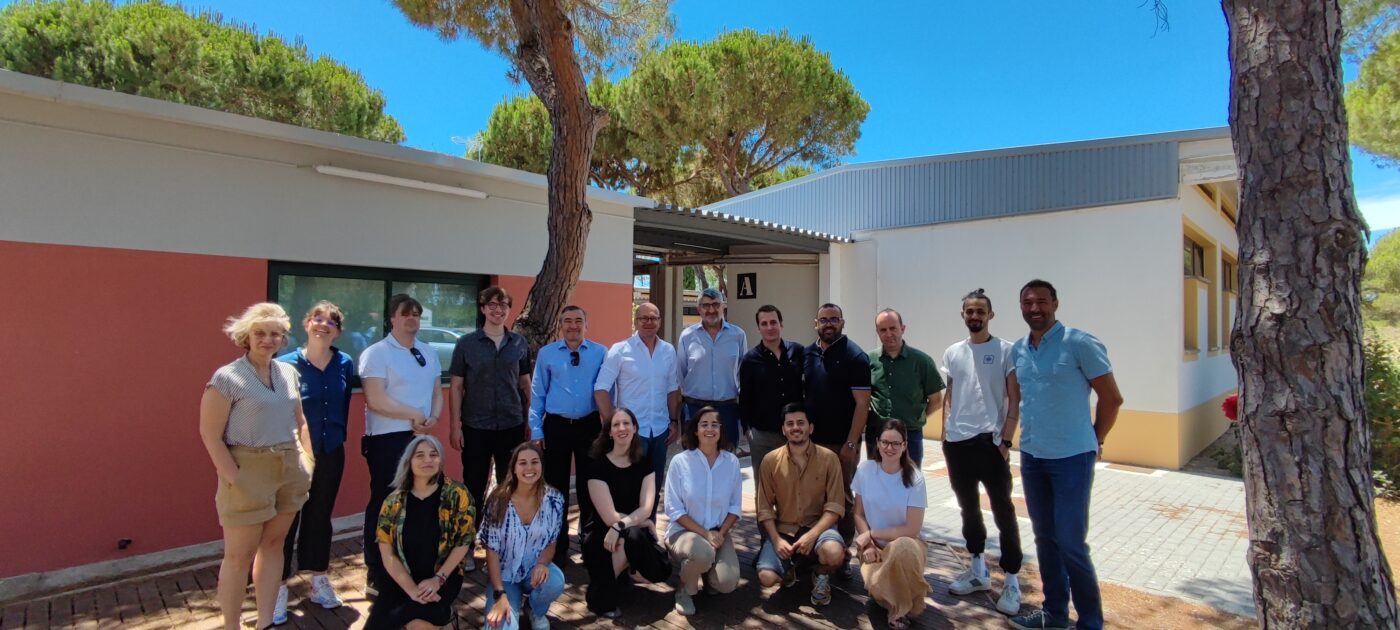
Fish-X General Assembly – June 2024
The Fish-X General Assembly was held on 26th and 27th June 2024, at the Campus de Gambelas, University of Algarve, Faro, Portugal. The assembly aimed to provide a project update, address pain points identified in the interim review, and plan for upcoming events and the final project expo. The event gathered all consortium partners for discussions, updates, and strategic planning sessions to ensure the project’s objectives are met.
The opening day began with a get-together and morning coffee, followed by a welcoming note and introduction by the project lead, TMT. A comprehensive progress update for Project Year 2 covered the project’s status, deliverables, milestones, amendments, project management tools, and critical risks. Feedback and lessons learned from the second year were also discussed.
The session on Projection of Project Year 3 outlined the monthly retro meetings, upcoming events, tasks, and next steps for 2024/2025. It included a review of the deliverable process, final reporting timeline, and financials.
Updates on the Atlantic, Mediterranean, Baltic, and Irish use cases were presented, focusing on progress and challenges. Demonstrations and updates on the Fish-X Data Space, Insight Platform, and Traceability Platform were also provided.
Discussions also covered the planning upcoming events including Workshop 2, the final online expo, the final conference, webinars, and working group meetings. Updates on recreational fisheries inclusion and stakeholder engagement, digital tools development progress, and ethics advisory were also presented. The day concluded with a dinner, offering participants an opportunity to network and discuss informally.
The second day started with a get-together and morning coffee, followed by a recap of Day 1 by the TMT.
The Breakout Session 1: ‘Deep Dive into Exploitation’ focused on technical and non-technical expectations, including future governance, business models, and post-project capacity building.
The Breakout Session 2: ‘Use Cases and Digital Tools’ analysed use cases and the integration of the Insight Platform and Traceability Platform into the Data Space.
During the Expert Session, Industry Roadmap and objectives were presented, followed by expert reviews and feedback on fostering scientific research through Fish-X digital tools. The assembly concluded with a summary of the two days’ discussions and outcomes, followed by a dinner, providing a final networking opportunity.
On 28th June, a side event was organised for an optional boat trip to observe fishers and trial partners. The trip offered participants a practical insight into the fishing operations and data collection in real-time.
Overall, the Fish-X General Assembly was a productive event, fostering collaboration, addressing key project challenges, and setting a clear path forward for the project’s final phase.

How Digital Technologies can support Small-Scale Fisheries in the Portuguese Atlantic Basin
The 5th working group meeting of Fish-X Project was organised on 20 June 2024 on the topic of ‘How Digital Technologies can support Small-Scale Fisheries in the Portuguese Atlantic Basin’.
Marcus Wiemann, Fish-X Project Officer from EU Tech Chamber, welcomed the participants and moderated the meeting.
Jana Stünkel, Fish-X Project Coordinator from TransMarTech, delivered the opening presentation about the Fish-X project and briefed about the background of the project along with updates. To read more about the project, please visit https://fish-x.eu/
The 1st keynote speaker Nuno Sales Henriques, Researcher and PhD fellow at CCMAR, presented on the topic of ‘Improving knowledge on fisheries using Vessel Tracking and Fishery Dependent Data’. While the other keynote speaker, Dra. Cristina Rosa, Head of the Natural Resources Department at DGRM, focused on the ‘Support Strategies and Practical Forms of Digitalisation in Portuguese SSF’ in her presentation.
Gonçalo Carvalho, Oceans and Fisheries Activist at Sciaena, moderated the panel discussion and Q/A session. The two panelists included Karim Erzini, Professor at Faculty of Science and Technology, University of Algarve – CCMAR, and André Dias, Fisher Representative of Ferragudo/Algarve.
The panelists emphasised the importance of empowering fishers with knowledge to help them better understand their activities. With this comprehensive information and education, fishers can optimise their practices, leading to more sustainable fishing methods and better management of marine resources.
The participants remained active and engaged during the discussion and allowed Fish-X consortium partners to learn valuable insights on this specific topic. The meeting ended at the vote of thanks to all participants from the moderator.
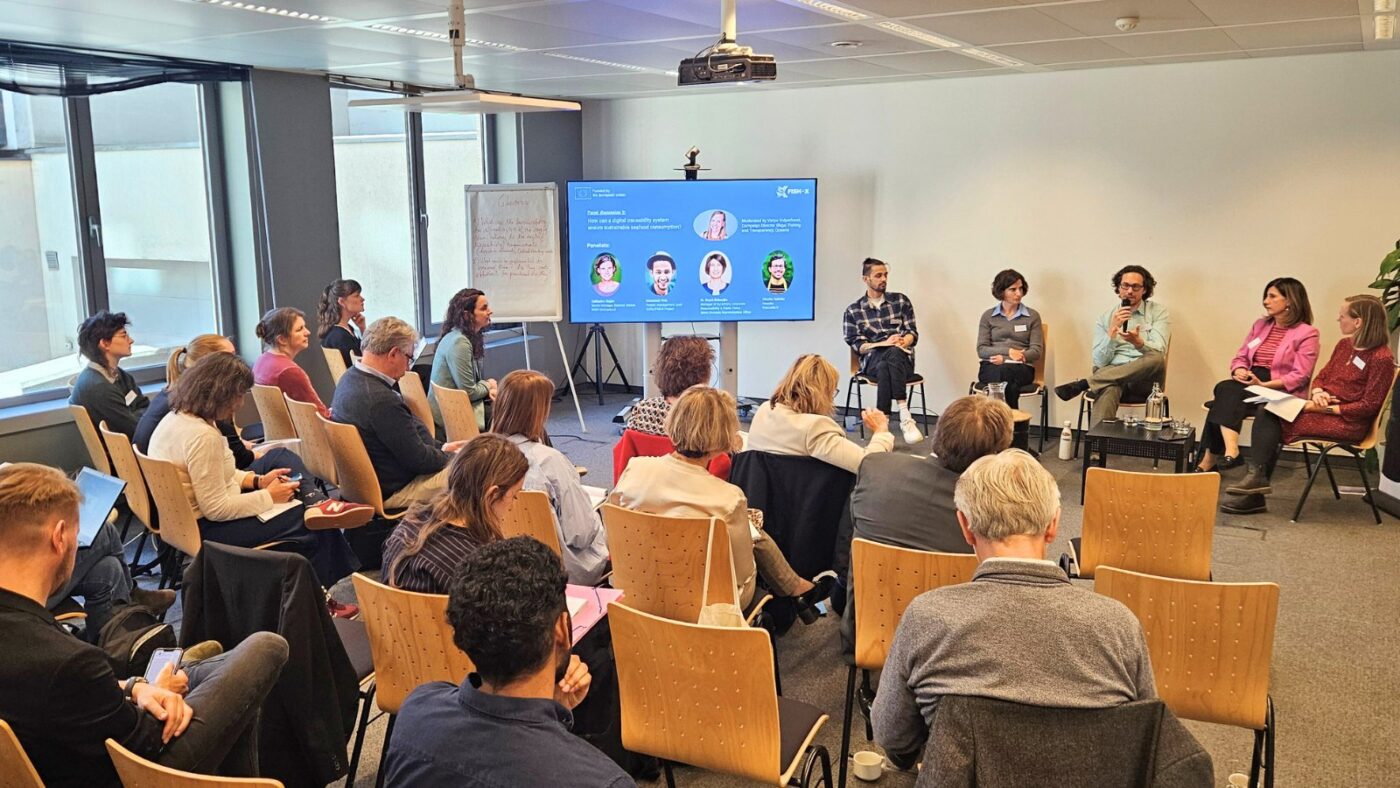
Fish-X 2nd Conference: “Digital traceability: Boosting sustainable seafood consumption in the EU”
The Fish-X consortium partners organised its second conference “Digital traceability: Boosting sustainable seafood consumption in the EU”. The event took place on Wednesday, 10th April 2024, at 09:00 – 17:00 hrs CEST, at the WWF European Policy Office in Brussels and it was physical event only.
The conference’s objective sought to explore how digital traceability can steer sustainable seafood consumption by effectively implementing relevant EU legislation and providing meaningful information to consumers.
With the latest piece of EU fisheries legislation – the conference focused on how seafood traceability has a role to play in fully documenting fisheries to better understand how to fish sustainably, decarbonising fisheries sectors, building resilience and adapting to climate change events. Much still needs to be done to match the 55% emission reduction targets by 2030 and to protect 30% of our seas by 2030. One way of doing this is by changing the way we, as a society, produce, transport, process and consume seafood to alleviate the humans’ burden on our seas.
The morning session was dedicated to New Monitoring Control Surveillance (MCS) measures enforced by the EU Fisheries Control Regulation, while the afternoon session focused on How can digital traceability system ensure sustainable seafood consumption.
The conference was attended by 42 participants from EU institutions, fisheries advisors from permanent representation of Member States to the European Union, national ministries for agriculture and fisheries, research institute, civil society organisations, advisory councils on fisheries management, producer organisations and the fishing industry.
The key participants included Dr. Antonia Leroy, WWF EPO, who moderated the conference, Anne Gautrais-Le Goff, Başak Babaoğlu, Catherine Vogler, Charles Guirriec, Esben Sverdrup-Jensen, Huw Thomas, Immanuel Virdi, Jana Stünkel, Margreet Brinxma, Rita Sá and the two moderators of the two panel discussions: Louis Lambrechts and Vanya Vulperhorst as well as Fish-X consortium partners.
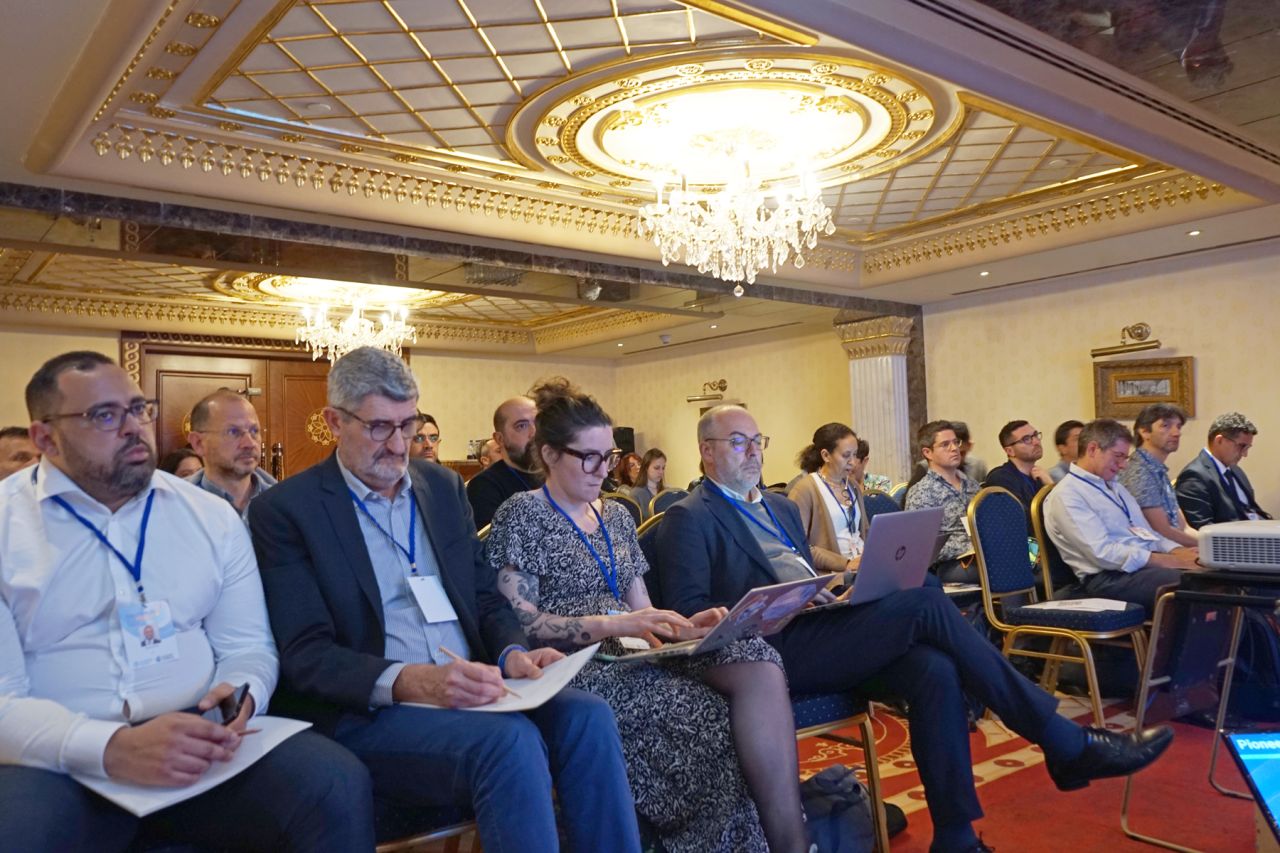
Fish-X Workshop at Fish Forum 2024: “Uniting forces for sustainable fisheries through digital collaboration and innovative technologies"
Fish-X featured in a well-known event Fish Forum 2024 with its workshop that took place on 19 February 2024 in Antalya, Turkey. The workshop was organised jointly by the Global Fishing Watch and the Fish-X Project. Around 40 participants attended the workshop in person.
New regulations have arrived in the EU for digital monitoring of Small-scale Fisheries (SSF) over a transition period until 2030, which will increase the number of vessels monitored and generate large data sets.
The workshop kicked off with the Global Fishing Watch providing an extensive demonstration of their open-access web platform and hands-on training. Maps showed the distribution of fishing vessels, based on AIS position reports and SAR (satellite radar detections of vessels, reporting or not). The discussion included:
• Emerging technologies such as vessel tracking data and satellite imagery can play an important role in assessing fishing footprint and monitoring existing or new measures.
• Collaboration with local experts is vital to ensure data reliability and to understand data applications.
• It is fundamental to understand and visualise well the data limitations and uncertainties.
In the second round, Fish-X consortium partners introduced the Fish-X digital tools/deliverables (available by the end of 2024):
• Fish-X Data Space, a new way of managing fishing data to allow their protection, respect the sovereignty of data contributors (e.g. fishers), and allow multiple usages (science, control, co-management, commercial).
• Insight web platform to illustrate the use of Data Space with a focus on SSF vessel positioning and reports.
• Artificial Intelligence (AI) applied to SSF vessel trajectories for automatic recognition of the fishing gear (including polyvalent vessels) and estimate of apparent fishing effort.
The discussion highlighted the need for SSF vessel trajectories with high resolution (10 minutes at most) and well-labeled datasets. A questionnaire collected requirements applicable to the Insight web platform.
WWF MED, one of the consortium partners of Fish-X, presented practical experiences of digital monitoring tools for SSF in Croatia and past trials in Greece.
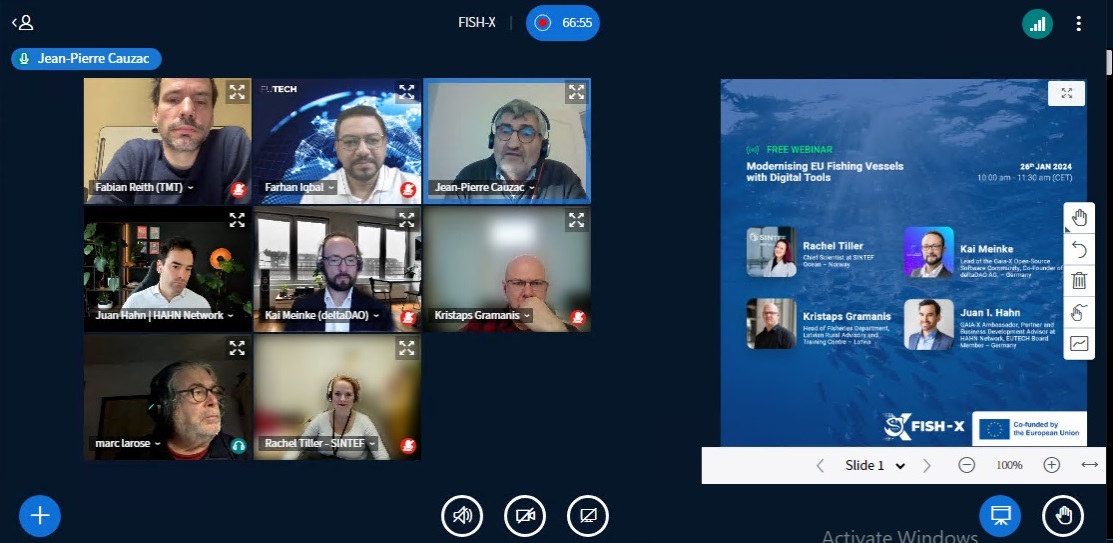
Fish-X 6th webinar: “Modernising EU Fishing Vessels with Digital Tools”
The 6th webinar of the Fish-X project was held on 26th January 2024, on the topic of ‘Modernising EU Fishing Vessels with Digital Tools’. The number of participants was around 150.
The webinar was focused on the European Council recently adopted revision of the EU Fisheries Control Regulation. The aim is to ensure that EU fisheries control and monitoring systems stay up-to-date with the latest technological developments and enhance the management of fishing activities.
Considering these developments, this Fish-X webinar was dedicated to the integration of digital tools into small-scale fisheries (SSF) vessels, and how the concept of dataspace could support the management of all new data sets generated by these tools. This webinar marked the initial chance to delve into the diverse experiences within Gaia-X dataspaces, as shared by one of the speakers. These insights shed light on potential pathways for enhancing collaboration and innovation within the Gaia-X ecosystem. Another highlight was the discussion surrounding EveryFish 3D modelling of fish.
Farhan Iqbal, Fish-X Manager – Marketing, Communications, & Events from EUTECH, along with Jean Pierre Cauzac – Strategic Project Manager from CLS, moderated the webinar. The event kicked off with a welcome note to the participants. EUTECH organises a series of webinars like this one along with the Fish-X consortium partners to mobilise and invite key stakeholders and interested participants to contribute to the strategic vision of the project and the roadmap to digital transition.
During the webinar, the conversation explored how digital tools can redefine and optimise various aspects of fishing operations. From real-time monitoring of fishing activities to data-driven decision-making as well as incorporation of digital tools promises to enhance overall operational efficiency. The technology contributes to responsible fishing practices and the long-term health of marine ecosystems, ensuring the future of fishing activities.
The three keynote speakers included Rachel Tiller, Chief Scientist at SINTEF Ocean from Norway; Kristaps Gramanis, Head of Fisheries Department, Latvian Rural Advisory and Training Centre; and Kai Meinke, Lead of the Gaia-X Open-Source Software Community, Co-Founder of deltaDAO AG. from Germany.
Digital transition of catch monitoring in European fisheries
In her presentation, Rachel Tiller, highlighted the focus of EVERYFISH, a project funded under Horizon Europe Programme. Commencing on January 1, 2023, the project spans 48 months, concluding on December 31, 2026. The project boasts 17 partners from 8 countries, including 3 associated partners from the UK, namely the University of East Anglia, CEFAS, and the University of St. Andrews. For more information, visit the project website at everyfish.eu.
They are developing scanners which are creating a 3D image of fish. This technology is referred to as digital twins. Using the AI, it can recognise the fish species and has been trained to do so. This technology can tell about the specie, weight, and length of fish and probably in future can also tell about the quality. In this way, the data is collected and is available to fishers, government authorities, and research institutes. The aim is to make technology useful for fishers and make their work easy. She said that there is a trust deficit between fishers and authorities and this technology can allow fishers to prove they are compliant and authorities can verify it using this data and tools.
She explained with a chart that fisheries management involves a multifaceted approach encompassing quotas, real-time closure monitoring, and reporting mechanisms. Quotas are set to regulate the amount of fish that can be harvested, while real-time closure systems ensure compliance with these limits by automatically halting fishing activities in designated areas when quotas are reached. Reporting mechanisms facilitate the accurate recording of catch data, including details on species and quantity, upon landing. Additionally, the integration of automatic catch registration technologies streamlines the process, enhancing efficiency and accuracy. Subsequently, this data plays a crucial role in market transactions and processing activities within the fishing industry. We need to understand that fishers are the ones who are giving us information what is in the waters. So, fishers should be trusted with data and be encouraged to reduce the discards.
She emphasised the positive role of fishers in the integration of digital tools and technologies. The most important data comes from fishers that supports electronic monitoring systems and data analytics, to improve the accuracy, efficiency, and sustainability of monitoring fishing activities and catch reporting within fisheries. Trust building amongst stakeholders will enhance compliance with regulations, promote responsible fishing practices, and ensure the effective management of marine resources.
Small-scale Fisheries in Latvia
The presentation by Kristaps Gramanis from Latvian Rural Advisory and Training Centre focused on the SSF in Latvia. SSF play a significant role in the fishing industry, characterised by vessels with a length of up to 12 meters. This sector comprises approximately 600 fishing boats, encompassing both commercial vessels and those utilised by self-consumption fishers. Representing about 90% of the fishing fleet in Latvia, SSF contribute around 3% of the country’s total catch. Passive fishing gears such as gillnets, trap nets, and pound nets are commonly used by small-scale fishers, particularly targeting Baltic herring.
He also shared some initial findings from a survey revealing key insights into the characteristics and practices of the SSF in Latvia. Boat lengths range from 4.3 to 7 meters, with some extending up to 10 meters. The age of the boats spans from 1 to 50 years, showcasing a varied fleet. Electricity is primarily provided by batteries, supporting onboard operations. Electronic devices are limited, with smartphones being the most common. Fish caught are typically stored on ice within the boats, destined for sale either to fish processing companies or through direct transactions. Interestingly, there is little concern expressed regarding the subsequent fate of the fish post-sale, as Latvian legislation and state institutional systems ensure the traceability of fishing products, thereby instilling confidence in the supply chain’s integrity and compliance.
The Latvian Fisheries Integrated Control and Information System serves as a comprehensive national database overseen by the Ministry of Agriculture. This system functions to gather and manage various crucial data related to fisheries activities, including information on fishing operations, fish landings, market prices of fish, lists of registered fishing vessels, and the registration details of fishers and fish buyers. Additionally, it monitors and records instances of fishing violations. The system caters to a diverse range of users, including fishers, operators such as first buyers and fish processing companies, transporters, municipalities, and regulatory bodies such as the State Environmental Service, Food and Veterinary Service, Customs, and the scientific institute ‘BIOR’.
He also shared various challenges confronting the country’s SSF such as aging of fishers poses concerns about succession planning and the transfer of knowledge and skills. Attracting new fishers is essential to maintain a vibrant and sustainable workforce. Decreasing incomes amid rising costs and market pressures affect the financial viability of fishing operations. Decreasing fish quotas restrict the potential yield, impacting both revenue and livelihoods. Raising the prestige of the fishers is crucial for recognising the profession’s importance and attracting talent. Administrative burden, including regulatory compliance and paperwork, adds to operational complexities. Improving the working environment, such as safety measures and amenities aboard vessels, enhances the well-being of fishers. Managing seals and cormorants, which can impact fish populations and pose challenges for fishers, requires effective mitigation strategies.
Digital Service Ecosystem for Fish-X
The presentation by Kai Meinke focused on Pontus-X which is a Digital Service Ecosystem, based on Gaia-X framework similar to Fish-X Data Space and digital tools being developed. His company deltaDAO is a small enterprise and leading technology provider based in the EU, specifically Germany, dedicated to supporting European data space initiatives. Since 2021, deltaDAO has been at the forefront of deploying an open and functional ecosystem of federation services, with plans to transition to full-scale production by 2024.
Their technology focuses on developing Data Space Operating Models that encompass a spectrum of (de-)centralisation strategies. They facilitate the creation of enabling services and business models for AI and data ecosystems, seamlessly integrating data, software packages, AI, and SaaS solutions, including Federated Analytics. deltaDAO combines both existing and new infrastructure, spanning edge, on-premises, cloud, data streams, and AI technologies.
Instant settlement using digital EURO ensures efficient transactions, while preserving intellectual property and ensuring GDPR compliance through Compute-to-Data and Compute-to-Edge methodologies. Identity and trust are established through eIDAS TSPs and Gaia-X Conformity Rules, with contracting facilitated by digital signatures within Terms & Conditions and data use agreements.
Participation in or operation of Pan-European network infrastructures is open to all stakeholders, with deltaDAO already integrating Federated Catalogue and Gaia-X Digital Clearing House functionalities. Their innovative Compute-to-Data technology allows for computations to be performed directly on data, safeguarding privacy and data sovereignty by limiting access to trusted applications on trusted infrastructure.
In the panel discussion, all the speakers participated and answered different questions asked by the audience and consortium partners. During the discussion, it was highlighted that on the one hand, the challenge is to push the fishery industry towards digitalisation, showcasing to young people the attractiveness and opportunities of digitalisation in their jobs. On the other hand, the challenge is about the technology which is currently being developed, that how to provide more distributed solutions that protect the sovereignty of information.
This is necessary because there is significant skepticism within the fishery industry regarding data sharing, which can be addressed by creating a data platform based on the concept of Gaia-X. Over the following years, the project aims to achieve greater transparency and usability of fishing data, attracting consumers to engage with the data.
In one of the questions, it was asked if fishers will need to pay for the information and use of Pontus-X, based on their role as data providers. Kai Meinke addressed this by explaining the role of fishers as contributors: Fisheries providing access to data should receive fair value in return, negotiated by the participants. Users who do not provide data pay a user fee, thereby rewarding providers and avoiding free riders.
Another question explored how to enter a world with existing digital tools and knowledge. Rachel highlighted that while people are developing tools for the fishery industry, Fish-X, supported by multiple partners, develops solution options based on empirical and scientific findings to offer an adaptive comprehensive solution system.
Kai emphasised the importance of not losing data sovereignty. In international cooperation, only negotiated data under jurisdiction should be shared, ensuring technical sovereignty and control. Another question delved into opinions on incentives for small-scale fishers as data providers. Kristaps illustrated the situation in the Baltic Sea, suggesting that even with an improved system, there may not necessarily be more successful catches due to limited fishing stocks.
Another question focused on protecting the ecosystem from overfishing. Rachel acknowledged that overharvesting cannot be avoided but emphasised that the Fish-X system provides the chance to control catches. If overharvesting is observed, regulations will apply and those responsible will be punished for noncompliance. Ultimately, the project saves time and fuel and increases economic efficiency among fisheries.
The participants were highly engaged in the conversation by writing comments and questions, which created a dynamic and interactive Q/A session. The webinar concluded with vote of thanks to all the speakers, panelists, and participants for joining the discussion. The participants were also encouraged to subscribe to Fish-X newsletter and follow Fish-X social media channels: LinkedIn, Twitter, Instagram, and YouTube, to stay updated about the future developments of this project.

Fish-X 5th Webinar: “Preparing for the future: Small-scale Fisheries Digitalisation in the Baltic Sea and Northern Sea”
The 5th webinar of the Fish-X project was held on the 27th of October 2023, on the topic of ‘Preparing for the future: Small-scale Fisheries Digitalisation in the Baltic Sea and Northern Sea’. The number of participants was around 100.
The webinar was of immense significance, addressing critical challenges within the small-scale fisheries (SSF) sector operating in the Baltic Sea and Northern Sea. These challenges encompass the over-exploitation of fish stocks, substantial reductions in fishing quotas, constrained fishing and sales prospects, a declining appeal for young talent to engage in the sector, diminishing SSF, and a growing conflict of interests in coastal and marine areas. Through comprehensive discussions and expert insights, the webinar provided valuable solutions to these pressing issues, paving the way for a more sustainable and thriving SSF industry.
Farhan Iqbal, Fish-X Manager – Marketing, Communications, & Events from EUTECH, along with Immanuel Virdi – Project Manager from OURZ, and Jean Pierre Cauzac – Strategic Project Manager from CLS, moderated the webinar. The event kicked off with a welcome note to the participants. EUTECH organises a series of webinars like this one along with the Fish-X consortium partners to mobilise and invite key stakeholders and interested participants to contribute to the strategic vision of the project and the roadmap to digital transition.
Marius Hölter, Fish-X Coordinator from TransMarTech, delivered the opening presentation about the Fish-X project. He briefed about the background of the project stating that it is a 3-year project of 6 million euros, co-funded by the EU Horizon Europe Programme. It is a technology and open-source driven project. To read more about the project, consortium partners, and their activities, please visit https://fish-x.eu/
During the webinar, the conversation centered on the potential for regional SSF, in the Baltic Sea and Northern Sea, to enhance their sustainable management practices through the utilisation of an expanding range of digital tools and resources. These technological solutions have the capacity to aid in the improvement of fishing and catching techniques within these communities.
The two keynote speakers included Hanne Lyng Winter, Political Adviser and Marine Biologist at Foreningen for Skånsomt Kystfiskeri from Denmark; and Oliver Greve, Managing Director of the Fishery Cooperative Wismarbucht eG in Wismar from Germany.
In her presentation, Hanne Lyng Winter explained that the FSK-PO, or Danish Small-Scale Fishermen’s Producer Organisation, plays a crucial role in organising small-scale vessels engaged in various fishing methods such as set nets, pots, pound nets, hooks, and Danish anchored seines. Established in 2014 and officially recognised as a producer organisation in September 2019, the FSK-PO boasts approximately 100 members across Denmark. Key milestones in its journey include the incorporation of low-impact fishing into Danish law in 2016, the introduction of a state label for low-impact caught fish in 2020, and the allocation of more quotas to low-impact fishers in 2016. The organisation focuses on fostering sustainable practices and has been instrumental in implementing initiatives to monitor bycatch and explore measures for reduction, with specific attention to data control by fishers through projects like the Black Box initiative in collaboration with DTU Aqua.
She informed that Denmark has around 200 commercially active SSF, accounting for approximately 37% of the total fleet with 676 vessels. Historically targeting cod as a primary species, SSF in Denmark now diversifies their catch to include plaice, haddock, sole, turbot, mackerel, garfish, as well as snails, edible crab/brown crabs, lobsters, and prawns. Despite constituting only 4% of total Danish landings, SSF contributes significantly to revenue, making up 17% of the total. Challenges faced by SSF include factors such as decreasing fish populations, environmental issues like seals and cormorants, and competition with larger vessels in the North Sea. However, the sector also seeks to improve conditions through various means, including securing quotas, enhancing access to waters, exploring new business models, and promoting the industry’s green and sustainable future. The call for recognising SSF as a vital part of the future, attracting a young generation to the profession, and implementing flexible and cost-effective regulations underscores the multifaceted efforts toward the sustainable development of SSF in Denmark.
The presentation by Oliver Greve focused on the future of coastal fishing in the Baltic Sea, which faces significant challenges, particularly in the Western Baltic Sea, where herring quotas and catches are rapidly decreasing, almost reaching zero levels. Compounding this issue is the aging demographic of fishers in Mecklenburg-Western Pomerania (MV), with an average age of 57 and a notable absence of trainees in 2023. The critical question now shifts from how to assist existing fishers to how to attract new generations and rekindle interest in coastal fishing, essential for preventing the extinction of this vital industry.
He highlighted that MV holds a substantial portion of Germany’s coastline, encompassing over 75% of the country’s 2,389 kilometers of coastal expanse and boasting 794 islands. Despite this, there is a pressing need to address the decline in the coastal fishing sector. The challenges include a dwindling population of fishers, resulting in a loss of competence and cultural presence. Furthermore, the absence of structured, comprehensive, and long-term marine monitoring and data collection, coupled with insufficient support for marine projects from operational experts, exacerbates the issue.
To address these challenges, he added, the Sea-Ranger MV initiative emerges as a multifaceted solution. It focuses on fisheries and environmental aspects by monitoring fish habitats, fish populations, and actively maintaining biotopes. The initiative supports the state and scientific community in environmental monitoring, engages in the production of marine organisms through aquaculture, and undertakes projects to adapt fishing methods and technology. Additionally, the Sea-Ranger MV initiative plays a role in tourism, maintaining a presence along the coast and in ports, communicating with and supporting interested tourists, and collaborating on supportive projects. The concept of “Fisheries in Transition” emphasises preserving fishing as a core competency for the country, safeguarding moorings, boats, and fishing technology, and promoting diversification and marketing within the industry. Notable projects like “habbal” and “fisherboat 2.0” underscore the Sea-Ranger’s commitment to addressing specific issues, such as harmful algal blooms and the development of sensor technology for marine data and by-catch monitoring. Crucially, the initiative recognises the pivotal role of digitalisation in fishing boats as a key factor in understanding and addressing the challenges faced by the Baltic Sea.
The two panelists included Gyde Wollesen, Head of Impact at followfood from Germany; and Dr. Andreas Reinhardt, Co-Founder& CEO at Frisch Gefischt GmbH also from Germany
During the discussion, Gyde Wollesen emphasised the pivotal role and responsibility of fishers in acquiring, processing, and analysing data. It underscores the increasing importance of data-driven practices in the evolving landscape of future SSF. The discussion delved into the idea that, as the fishing industry undergoes transformations, fishers need to actively engage with data to adapt to the evolving system.
It was also discussed that ‘How fishers can transition to the new system?’ which further builds on the theme of adaptation. It involves considerations such as the adoption of new technologies, shifts in fishing practices, compliance with emerging regulations, and the development of skills necessary for sustainable and efficient fishing practices in the evolving system.
Dr. Andreas Reinhardt highlighted that smaller, local fisheries resist adopting trackers, feeling overlooked compared to larger counterparts, contributing to a sense of discrimination. The reluctance stems from a perception that broader industry issues take precedence over their specific concerns. However, it must be realised that digitalisation in fisheries offers solutions to challenges, aiming to enhance efficiency and sustainability.
Fishers are concerned about the EU, viewing it as a controlling body imposing overly strict quotas. To address this, the suggestion was to reframe the narrative by emphasising the EU role in supporting sustainability. The focus should be on encouraging SSF to recognise the superior quality of their products and understand the EU commitment to sustaining valuable but endangered species through responsible fishing practices.
It also came under discussion that whether small-scale fishers receive higher prices per kilo and if their overall salaries are elevated which is not the case; the reason being the limited catch and involvement of limited fishers. Additionally, the geographic reach for selling products remains constrained to around 20 kilometers, as the infrastructure necessary for fish transportation becomes expensive for smaller quantities. Moreover, attracting newer generations to the industry faces hurdles, as potential fishers seek specific details like work hours and fixed salaries, demands often unmet in the current fishing landscape.
Regarding monitoring developments, the example of “boat 2.0” was highlighted. There are unsustainable techniques for monitoring by-catch that have been in use for decades, which is a challenge. The required technologies are yet to be specified in many areas and necessitate further development. Additionally, acquiring new vessels poses challenges, calling for a shift not only to “fishing-boat 2.0” but also to a “Fisher 2.0” capable of transitioning to more sustainable and modernised fishing vessels, addressing both logistical and financial considerations.
The speakers also highlighted the importance of information exchange between consumers and fishers, emphasising the need to portray fishers as providers, not just collectors. Educating consumers about fishing processes and encouraging them to choose sustainable fisheries was deemed essential, considering the limited awareness of SSF and supply chains in the industry.
They also emphasised the need of communicating to fishers that the implemented monitoring methods serve a purpose and ultimately benefit them. This involves showcasing tangible changes resulting from new data-collecting methods and illustrating how these mechanisms can redefine the role of fishers. Examples were provided, illustrating fishers as environmental monitors and protectors not only of fish but also of water quality and local flora.
The participants were highly engaged in the conversation by writing comments and questions, which created a dynamic and interactive Q/A session. The webinar concluded with vote of thanks to all the speakers, panelists, and participants for joining the discussion. The participants were also encouraged to subscribe to Fish-X newsletter and follow Fish-X social media channels: LinkedIn, Twitter, Instagram, and YouTube, to stay updated about the future developments of this project.

Fish-X 1st Workshop with Maritime Authorities “The Basics of Digital Transformation”
The 1st Workshop (online) was hosted by EUTECH, on 12 October 2023, with support of the consortium partners, for selected representatives of the maritime authorities across different European countries.
The purpose of the workshop was to introduce the basics of digital transformation and its relevance in the context of SSF and the action plan envisioned in Fish-X; demonstrate the concrete benefits of data sharing and traceability through digital solutions; present initial samples of planned Fish-X demonstrators as showcases of how digital solutions can enhance practices in the fishing industry; gather practical insights on the requirements and needs for collaboration on the digital platform; encourage active participation in the 2nd and 3rd workshops to best tailor the Fish-X demonstrator to SSF needs; and promote Fish-X as an easily accessible solution for digital collaboration in the fishing industry.
The workshop was divided into four main sessions and each session was followed by discussion and Q/A round amongst the participants.
Session 1: Keynote Presentation – Impact of the revised EU Fisheries Control Regulation on Monitoring & Control of Small-Scale Fishers
Session 2: EU policy framework for the digital transformation of small-scale fisheries
Session 3: Introduction to Fish-X Dataspace and Insight Platform
Session 4: Introduction to Fish-X Traceability Platform and Use Cases
The keynote presentation: “Impact of the revised EU Fisheries Control Regulation on Monitoring & Control of Small-Scale Fishers” was delivered by Marta Moren Abat, Policy Coordinator of the EU fisheries Control Regulation implementation in the Directorate General for Maritime Issues and Fisheries, European Commission.
The two panelists – Séamus Bonner, Member of the board of Directors of LIFE, and Secretary IIMRO; and Tim Haasnoot, Director ProSea Marine Education – also shared their views and participated in the discussion.
To maximise the effectiveness of the event, EUTECH assumed the role of primary moderator, while other partners, served as trainers. These partners include North.io, CLS, OURZ, WWF EPO, and SCIAENA, each bringing their unique expertise to the table.
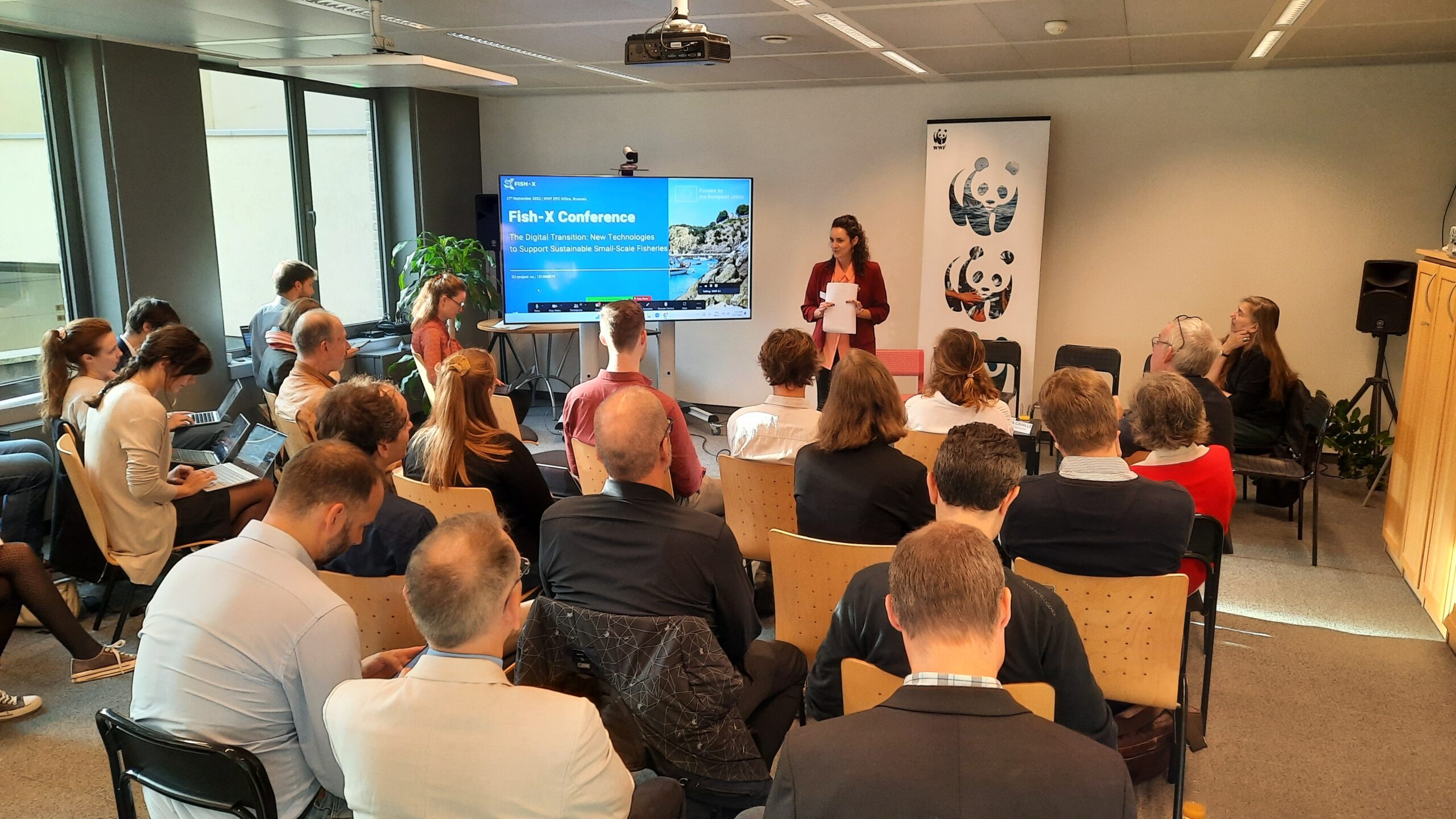
Fish-X Hybrid Conference: “The digital transition: New technologies to support sustainable small-scale fisheries”
The Fish-X consortium partners organised its first conference “The digital transition: New technologies to support sustainable small-scale fisheries”. The event took place on Wednesday, 27th September 2023, at 09:00 – 17:00 hrs CEST, at the WWF European Policy Office in Brussels and online.
The conference explored the development of new technologies to meet the needs of small-scale fishers, while complying with EU fisheries regulations.
With the latest piece of EU fisheries legislation – the EU fisheries Control Regulation – the conference coincided with a crucial need to explore ways forward for EU small-scale fisheries to adapt and be at the forefront of a sustainable fisheries management system thanks to digital solutions.
The morning session was dedicated to understanding how the EU legal framework can match the needs of small-scale fishers, while the afternoon session focused on the opportunities offered by technologies to map out, analyse, and assess sustainable fisheries management.
The conference was attended by around 50 participants in person and around 80 participants online. The attendees listened to an exceptional lineup of experts from the policymaking, maritime authorities, fisheries, technology, science, and civil society sectors. They shed light on innovative technologies reshaping small-scale fisheries while ensuring compliance with EU fisheries regulations.
The speakers included: Marta Cavallé, Secretary General, Low Impact Fishers of Europe (LIFE); Yves von Poeke, Head of Unit, C4 Data Management, DG MARE, European Commission; Dr. Fabian Reith, Fish-X Coordinator, TransMarTech; Hrvoje Čeprnja, Project Officer for Fisheries and Aquaculture, WWF-Adria; Kate Larkin, Head of the Secretariat of European Marine Observation and Data Network (EMODnet); Jean-Pierre Cauzac, Strategic Project Manager, CLS (Collecte Localisation Satellites); and Aimée Leslie, Conservation Director, WWF-Peru. The conference was moderated by Dr. Antonia Leroy, Head of EU Ocean Policy at WWF EPO.

Fish-X High-level Event at the EU Parliament
The high-level event was initiated by the Fish-X project and organised by WWF European Policy Office (EPO). MEP Guerreiro (Portugal, Greens/AFE) and MEP Pierre Karleskind (France, Renew), Members of the European Parliament, kindly co-hosted the event.
Following up on the Common Fisheries Policy (CFP) review report and moving forward on better implementing the CFP, the high-level event aimed to further engage in the discussion at EU level on existing small-scale fisheries (SSF) digital tools and opportunities to overcome the remaining challenges. The event gathered presentations on IT development towards sustainable and traceable seafood, and fully documented fisheries across fleet segments to support the effective implementation of the CFP. The presentations were followed by a panel discussion with four panellists and a Q&A.
This event forms part of a series of Fish-X events to mobilise and engage with stakeholders involved in the digitalization of the SSF sector.
Acknowledgement
The Fish-X consortium would like to thank the two Members of the European Parliament who co-hosted the event, Francisco Guerreiro and Pierre Karleskind, as well as the four speakers: Francesca Arena, Jose A. Fernandes, Rachel Tiller, and Ramón de la Figuera Morales. The Fish-X consortium is also thankful to Antonia Leroy for moderating the event. The summary report was drafted by Laure Guillevic (WWF EPO) and reviewed by Fish-X partners.
To read the full report, please click on the Download button.
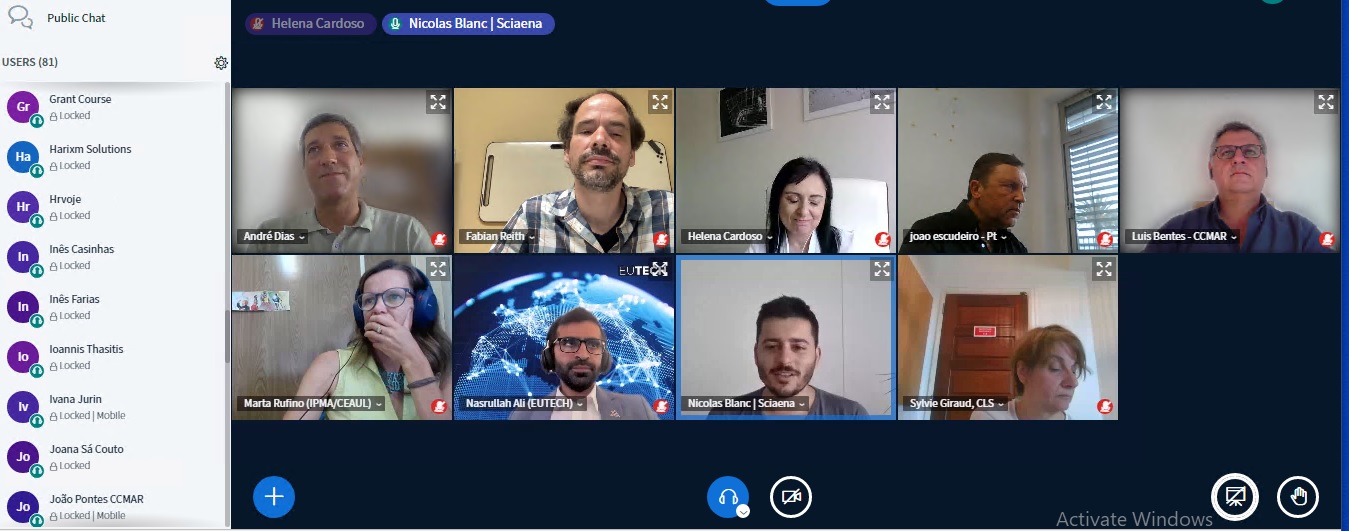
How can Portuguese small-scale fisheries benefit from digital technologies?
The 4th webinar of the Fish-X project was held on May 26, 2023, on the topic of ‘How can Portuguese small-scale fisheries benefit from digital technologies?’. The number of participants was over 90.
The webinar was of great importance because the small-scale fisheries (SSF), operating along the Portuguese coastline, are confronted with various obstacles, including the over-exploitation of fish stocks, degraded habitats, rising costs, limited access to information, and escalating conflicts of interest in coastal and marine areas. The discussion focused on how the Portuguese SSF can improve their sustainable management practices by making use of the growing array of digital tools and resources. These tools can assist in enhancing their fishing and catching techniques.
Nasrullah Ali, Fish-X Events Manager from EUTECH, along with Nicolas Blanc, Fisheries Officer from Sciaena, moderated the webinar and welcomed the participants. EUTECH organises a series of webinars like this one along with the Fish-X consortium partners to mobilise and invite key stakeholders and interested participants to contribute to the strategic vision of the project and the roadmap to digital transition.
Dr. Fabian Reith, Fish-X Coordinator from TransMarTech, delivered the opening presentation about the Fish-X project. He briefed about the background of the project stating that it is a 3-year project of 6 million euros, co-funded by the EU Horizon Europe Programme. To read more about the project, consortium partners, and their activities, please visit https://fish-x.eu/
As the title suggests, this webinar was focused on the Portuguese SSF and presented experts who possess extensive knowledge of the present challenges and potential solutions in this domain. The two keynote speakers included Marta Rufino, Researcher at the Portuguese Institute of the Sea and the Atmosphere (IPMA), with two decades of experience in ecological statistics, marine ecology, SSF, and biodiversity; and André Dias, Fishermen representative from Algarve, Portugal, a marine biologist from a family of fishermen in the Algarve, aimed to add value to the family business through his career.
Marta Rufino focused on tracking Portuguese SSF in her presentation and highlighted the concerning state of fish populations, which have declined by 50% over the past four decades. The oceans, which are overfished and under-protected, are on the brink of collapse.
To ensure sustainable fisheries, it is crucial to have data and knowledge that can support decision-makers. In Portugal, large-scale fisheries (LSF) employ 20% of fishers and boats and contribute to 70% of the fish catch. On the other hand, SSF employ 80% of fishers and boats, but their output accounts for 30% of the fish catch. SSF plays a significant role in providing food, employment, and preserving cultural heritage, as they operate near the coast in areas commonly used by humans. These areas are also biodiversity hotspots, serving as habitats for many commercial species’ juveniles.
SSF are generally more species-specific, resulting in fewer by-catches, and they are considered to have a lower impact on ecosystems, making them a more sustainable fishing practice. However, due to the lack of data, the true impact of SSF on ecosystems is not well understood.
The focus then shifts to the importance of integrating digital technologies into SSF. The question is not whether SSF should adopt digital technologies but rather how and which technologies to use. Some of the suggested technologies include trackers (such as based on GPRS and AIS) for high temporal resolution tracking, logbooks (paper or electronic), on-board cameras to monitor activity, catches, and by-catches, activity sensors like winches, and environmental/oceanographic monitoring either passively on fishing boats or gears.
The purpose of collecting detailed information through these technologies is to gain a better understanding of the fishing systems. The presentation poses questions such as whether it is more beneficial to obtain information from logbooks or cameras, what temporal resolution is required, and whether fishing boats can contribute to improving climate models for better climate change forecasts.
High-resolution fishing effort data is necessary for several reasons. Firstly, the ocean is a shared resource, and if it is not in a good state, there are risks for stocks and biodiversity collapse. Spatial management, such as marine spatial planning, can help avoid spatial competition and conflicts with other uses of the marine environment. Additionally, high-resolution data can provide insights into the impact of fishing on ecosystems, including the ability to observe the effects of management measures. This information is valuable for the establishment and management of marine protected areas. Furthermore, high-resolution data supports economic and social studies and is essential for stock assessment models, complementing traditional survey information.
She concluded her presentation with the emphasis on the need for data and knowledge to support decision-making in SSF. It highlights the importance of integrating digital technologies to gather detailed information about fishing activities, ecosystems, and the impact of fishing practices. By understanding and analysing this data, stakeholders can work towards sustainable fisheries management and the preservation of marine resources.
The presentation by André Dias focused on leveraging digital technology to benefit SSF and coastal communities, ultimately contributing to a more sustainable ocean. The speaker began by quoting their father, who believed that as long as there are fish in the sea, people will never go hungry. This quote emphasises the importance of preserving viable fisheries for future generations.
The two main topics highlighted in the presentation included marine spatial planning and online fish market apps. The speaker showcased several maps depicting fishing locations to enhance understanding and facilitate better management of fishing activities. One map displayed the fishing grounds of a group of seiners in the Western Algarve, utilising the Automatic Identification System (AIS) to track fishing activity. These maps help visualise the fishing areas and provide valuable insights into the dynamics of fishing activities.
He also emphasised on the emergence of new activities encroaching upon marine spaces, making it crucial to preserve viable fisheries within sustainable fishing grounds. One proposed approach is live monitoring of fishing activity to protect these fishing grounds. By establishing the value of each fishing zone and quantifying production in terms of the value and quantity of fish per hectare, it can become possible to optimise the fishing sector and maximise production through sustainable fishing gear.
He also addressed the issue of illegal, unreported, and unregulated (IUU) fishing in the Western Algarve of Portugal, using online fish-market apps as a means to combat this problem. These apps provide a platform for understanding and addressing various issues related to IUU fishing. He highlighted the prohibited sale of certain species, damaged or irregularly sized fish, and tax evasion as key concerns. Additionally, there was a recognition of the immoral discrepancy between the auction price and the price paid by consumers, indicating the need for fair and transparent practices.
To address these challenges, the speaker proposed the establishment of direct fish commercialisation circuits between fishers and consumers in coastal communities. Specifically, the development of an application controlled by Docapesca, an organisation involved in the fishing industry, would enable direct online purchases of fish from the fishers. This approach aims to bridge the gap between fishers and consumers, ensuring fair pricing and reducing opportunities for illegal practices.
The three panelists included Luis Bentes, Fisheries Biologist at the Center of Marine Sciences, Portugal; Helena Cardoso, Director Commercial, Communications, and Marketing at Docapesca, Portugal; and João Escudeiro from the Directorate-General for Natural Resources, Safety, and Maritime Services (DGRM), Portugal.
During the session, Helena explained how the Docapesca online platform connects fishers with consumers, providing fishers with the opportunity to create their own online stores. The platform, currently in the development phase, allows fishers to offer fresh fish for sale. The auction process on the platform is simple, and buyers can assess the quality of the fish through pictures and descriptions.
Luis highlighted a challenge faced by SSF in the Algarve region, where boats typically range from 6 to 7 meters in size; it is difficult to install digital tools on these smaller vessels, and they often lack the necessary energy backup to power such tools. To address this, it is important to demonstrate the benefits of digitalisation to fishers. If they understand and recognise these benefits, they are more likely to support and embrace digital technologies.
The discussion also touched on the changing demographics of the fishing industry. It was mentioned that there is an influx of younger fishers, most of whom are around 35 years old. These younger fishers appreciate the potential advantages of digitalisation and recognise its importance. However, Andre pointed out that there is a shortage of workers, as many laborers in the fisheries sector come from countries like the Philippines and Pakistan, often working for low wages or receiving a smaller share of the catch sale compared to Portuguese workers. This situation leads to a loss of knowledge and experience when these workers do not work long-term with the fishers. Marta expressed concern over this issue, considering it a form of exploitation and modern-day slavery, irrespective of the workers’ nationalities.
Andre further mentioned that fishers are required to provide data in logbooks, and failure to do so results in fines. However, the process of data collection needs simplification, and Docapesca can play a role in assisting fishers with this process.
João emphasised the importance of vessel monitoring, noting that vessels up to 8 meters in size can be equipped with Vessel Monitoring Systems (VMS). Communication with satellites is crucial for effective monitoring. However, there is a gap in the digital process after the first sale of the fish.
The participants agreed that all stakeholders recognise the importance of digitalisation in fisheries. They acknowledged that involving fishers in decision-making processes is crucial to gain their trust and secure their support for implementing digital tools. Fishers are key players in the digitalisation process, and their understanding of the benefits is essential. Interaction and engagement with fishers are important, and projects like Fish-X can serve as examples to showcase the advantages of digitalisation for all stakeholders involved in fisheries.
The participants expressed support for initiatives like Fish-X and expressed a desire to see its progress and learn from its outcomes, as it can serve as an important project for fisheries digitalisation across the European Union.
The participants were highly engaged in the conversation by writing comments and questions, which created a dynamic and interactive Q/A session. Nasrullah Ali concluded the webinar by thanking all the speakers, panelists, and participants for joining the webinar and informed that EU Tech Chamber will continue to organise such webinars and events to promote the awareness about the project and its progress in the future. The participants were also encouraged to subscribe to Fish-X newsletter and follow Fish-X social media channels: LinkedIn, Twitter, Instagram, and YouTube, to stay updated about the future developments of this project.
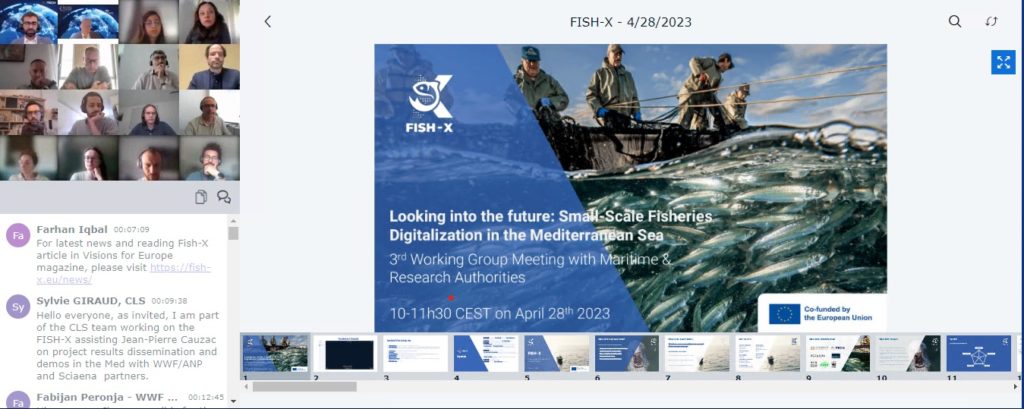
Looking into the future: Small-Scale Fisheries Digitalisation in the Mediterranean Sea
The 3rd working group meeting of Fish-X Project was organised on 28 April, 2023 on the topic of ‘Looking into the future: Small-Scale Fisheries Digitalisation in the Mediterranean Sea’.
Nasrullah Ali and Marcus Wiemann, Fish-X Project Coordinators from EU Tech Chamber, welcomed the participants and moderated the meeting.
Dr. Fabian Reith, Fish-X Project Coordinator from TransMarTech, shared the updates about the project and Preliminary EU Fisheries Roadmap for Digitalisation. To get involved into these and other activities of the project, please visit https://fish-x.eu/
The 1st keynote speaker, Dr. Imane Haddi, Fisheries Biologist, AuqaBioTech Group, Malta, presented on the topic of ‘Netting the Future: Digitalising Small-Scale Fisheries (SSF) in the Mediterranean Sea Challenges and Opportunities’ with the perspective of Malta.
The 2nd keynote on ‘First attempts to monitor and map SSF in the Adriatic Sea’ was presented by Luca Bolognini and Anna Nora Tassetti, Researchers from Institute for Marine Biological Resources and Biotechnologies of the National Research Council, Italy.
To further elaborate on the Mediterranean SSF situation and expand the discussions, Dr. Konstantinos Tsagarakis, Fisheries Biologist, Institute of Marine Biological Resources and Inland Waters of the Hellenic Centre of Marine Research, Greece, and Dr. Dražen Cepić, Assistant Professor at Department of Sociology, University of Zadar, Croatia, were also invited. These two panelists further expanded the debate by addressing the following points in the Q/A session.
A) Digital Integration and Data Management
- Based on your personal experiences, how can we integrate and synchronize existing and new digital tools to empower both the authorities and the SSF?
- What are some of the challenges that could arise to track vessels when implementing maritime spatial planning?
- What strategies can be employed to effectively collect and manage data related to small-scale fisheries, given that it is still a challenging task?
B) Engaging Fishers: Incentives and Trust-Building
- What do you think are the most important things to watch out for or to consider when reaching out to fishers regarding the use of digital tools?
- In your experience, what are effective incentives for encouraging fishers to participate in projects and use digital tools?
- How and what sort of confidence-building measures can be taken to establish motivation and trust between all involved actors?
Overall, the meeting was informative and allowed Fish-X consortium partners, with this specific topic, to deepen relationships with the maritime authorities in the Mediterranean region. The moderators concluded the meeting with vote of thanks to the participants and for engaging in valuable discussions that will help to advance well on the deliverables of the project.
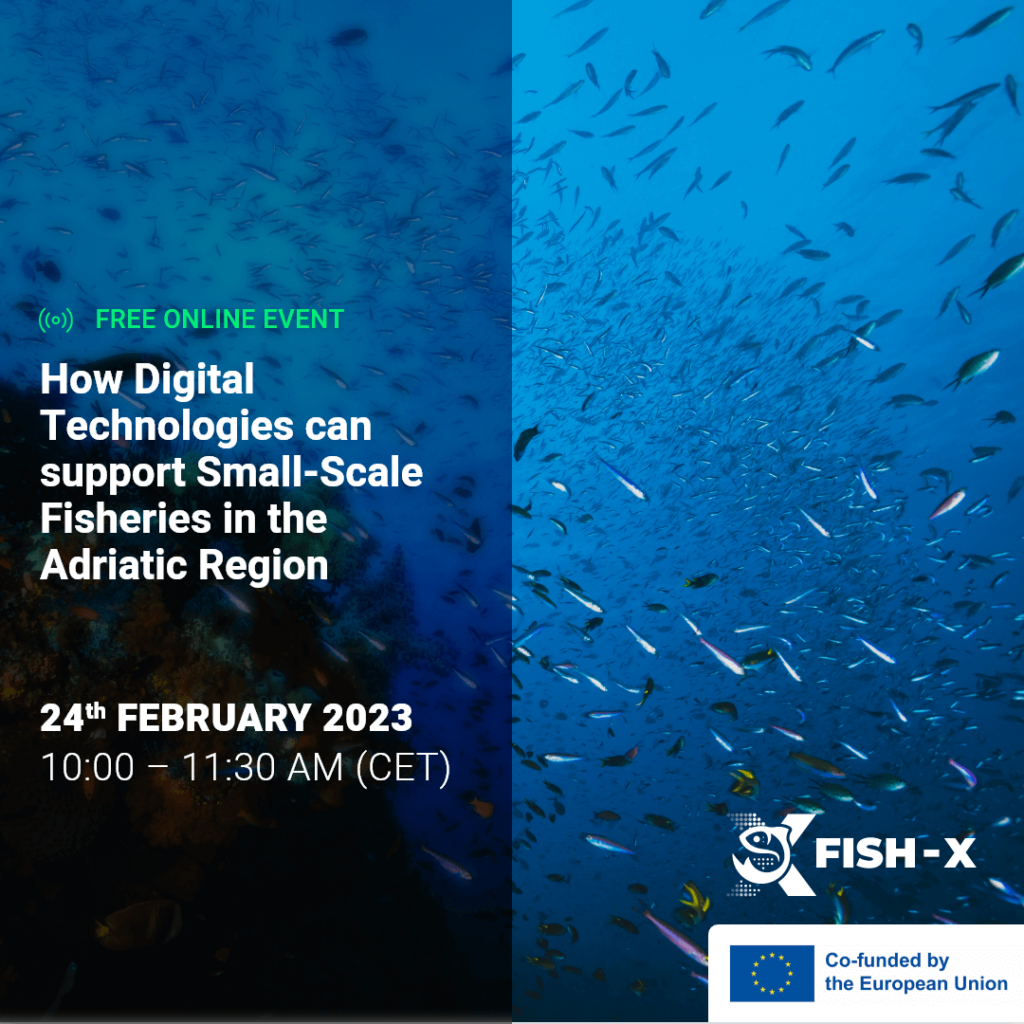
HOW DIGITAL TECHNOLOGIES CAN SUPPORT SMALL-SCALE FISHERIES IN THE ADRIATIC REGION
The third webinar of the Fish-X project was held on February 24, 2023, on the topic of ‘How Digital Technologies can support Small-Scale Fisheries (SSF) in the Adriatic Region’. The number of participants was over 100.
While the Adriatic region was known for its rich and diverse marine life, with overfishing today it is facing a major challenge with negative impact for the whole fishing industry. To return to a sustainable business, the use of digital technologies with access to better data will be essential as this will empower fishers to take better decisions on their catching behavior as well as to reduce time for fishing operations. To help improve the situation, the Fish-X Project creates a use case to let the fishers easily adopt these innovative digital technologies often perceived as unpractical or too difficult. Before implementation, it’s imperative to learn with this webinar about the prevailing challenges and overall situation from experts of the region and take these challenges into consideration while implementation.
Dr. Igor Gladkov, Fish-X Communication Manager from EUTECH, along with Fabijan Hrvatin Peronja, Programme Lead for Sustainable Blue Economy from WWF Adria, moderated the webinar and welcomed the participants. EUTECH organises a series of webinars like this one along with the Fish-X consortium partners to mobilise and invite key stakeholders and interested participants to contribute to the agenda of the project.
Marius Hölter, Fish-X Coordinator from TransMarTech, delivered the opening presentation about the Fish-X project. He briefed about the background of the project stating that it is a 3-year project of 6 million euros, co-funded by the EU Horizon Europe Programme. To read more about the project, consortium partners, and their activities, please visit https://fish-x.eu/
As the title suggests, this webinar was focused on the Adriatic region and Danijel Kanski, a fisheries consultant from Croatia, was the invited keynote speaker. Mr. Kanski is a fishery and aquaculture professional for over 15 years with focus on sustainability and minimisation of negative human impact on environment through support and promotion of best practices. He gave a detailed overview of the general situation of SSF in the Adriatic region, with a focus on Croatia. The Adriatic Sea is part of the Mediterranean Sea region, and both share the same management structure and situation. The Ministry of Agriculture and Department of Fisheries is the legal entity that is responsible for fisheries in Croatia. The country has put in place measures to adjust its fishing capacity with the available resources. As per 2021 statistics, the average length of SSF vessels is only 5.7 m and the average age is 40 years, which limits SSF activities to fishing grounds near the port and to one-day fishing trips only. There were 5,336 SSF boats which contributed to 3% of catch and 17% in value as compared to 869 LSF boats contributing 97% of catch and 83%in value.
In 2020, the average age of vessels license holders in the Croatian small-scale fleet was 59 years old. A small group of young vessel owners/license holders suggests that there may be a lack of initiative in opening a business in fisheries for newcomers which could have long-term consequences for the fleet in terms of the absence of successors in the fisheries business.
In the framework of the SOCFISH Project, SSF fishers answered a survey that they were satisfied with their overall work (significantly higher than the rest of the population) and that they see themselves in this industry for next five years. Most of the SSF catch is sold at the local market, and the income is often used as household expenses providing food security, primarily. For some fishermen, however, commercial benefit is not a priority since they have other sources of income.
In 2021, the total value of landings of small-scale fisheries in Croatia was €10.5 million, covering 17% of the total landing value. The SSF catches were highly diverse in 2021, which is a characteristic of the Mediterranean mixed fishery, with 36 species covering 90% of landing weight and 29 species covering 90% of value. In LSF the reality is quite different, being that four species cover 90% of landing weight and 17 species cover 90% of the value. Most of the landing weight and landing value consists of demersal fish (common sole, hake, seabream).
While explaining about the challenges of SSF, Mr. Kanski said that the Mediterranean fish populations are in a deep crisis. About 75% of fish stocks are still overfished in the Mediterranean, rising to 93% within EU waters, and total fish populations have fallen by more than one-third over the past 50 years. The cause of this ecological crisis includes fleet overcapacity, illegal fishing, and catches of unwanted species. If fishing practices don’t improve, stocks could collapse and the consequences for ecosystems, communities, and the economy will be enormous.
Narrowing down to the Adriatic Sea situation, fish stocks are in an even more alarming situation due to higher overfishing rates of demersal species in the Northern Adriatic Sea (geographical sub-area [GSA] 17), along with the high fishing pressure in marine habitats. The evidence urges the need to evaluate appropriate management approaches, mitigate several fishing activities simultaneously in the area, and minimize conflicts among them. On the bright side, there is good indicators that overexploitation of stocks has decreased over the past decade, with an accelerated reduction of fishing pressure in the last two years, particularly for key species under management plans. However, most commercial species are still overexploited, and fishing pressure is still higher in the Adriatic Sea.
The political will to improve the situation in the region is there, however, it requires a framework. The FAO Regional Plan of Action for SSF in the Mediterranean and the Black Sea has suggested following nine action points: Scientific research, SSF data, SSF management measures, SSF value chain, Participation of SSF in decision-making processes, Capacity-building, Decent work, Role of women, and Climate and Environment.
For better management of fisheries in Croatia, it was suggested that a large budget should be spent annually on collecting electronically encoded field data and make it widely accessible. Previously, data was recorded on paper, and archived at a few institutions, which eventually discard them. Data collection and distribution is a valuable contribution to science, and it has long term positive impact on the society. The technology used may involve electronic logbooks, GPS buoys, seafood traceability and transparency solutions, sensitive species tagging and monitoring, Baited Remote Underwater Video (BRUV) eDNA, and ghost gear removal with remotely operated vehicles.
Marina Masanović, Fisheries Biologist at NEPHROP in Croatia, participated in the Q/A session along with the keynote speaker. She was of the view that SSF fishers fear new technologies which is a challenge in digitalisation, as they find it complicated. They also have contracts with some buyers and directly sell their catch to them. However, if workshops are arranged to train these fishers they may be more open to digital technology in the future. Paying an extra premium against the catch may be a real incentive for fishers to use technology and make fisheries sustainable. Consumers behavior also needs to be more responsible towards what they consume and force the whole supply chain to adopt sustainable practices.
One of the participants shared an organisation LIFE and another shared https://foodnected.org/ which are also striving for sustainable food practices. WWF Adria also showed an engaging documentary on Croatia fisheries and can be watched via this link.
Some of the participants were highly engaged in the conversation by writing comments and questions, which created a dynamic and interactive Q/A session. Marcus Wiemann, Fish-X Project Officer from EU Tech Chamber, thanked all the speakers and participants for joining the webinar and informed that EU Tech Chamber will continue to organise such webinars and events to promote the awareness about the project and its progress in the future. The participants were also encouraged to subscribe to Fish-X newsletter and follow Fish-X social media channels: LinkedIn, Twitter, Instagram, and YouTube, to stay updated about the future developments of this project.
Key takeaways
- While diversity of fish species is broad, overfishing is a problem that needs better management with digital tools for sustainability of the local fishery sector in the Adriatic region. Facing this situation, the Croatian government needs to spend budget annually for collecting electronically encoded field data and make this data widely accessible.
- Since there are several players in the fishing sector across the region, it makes it difficult for data collection and data synchronisation creating a major challenge towards digitalisation of fisheries. Moreover, technology adoption by fishers also makes digitalisation difficult due to various reasons.
- SSF fishers in Croatia fear new technologies which is a challenge in digitalisation, as they find it complicated and complicated. However, training workshops and paying an extra premium against the catch may be a real incentive for fishers to use technology and make fisheries sustainable in the region.
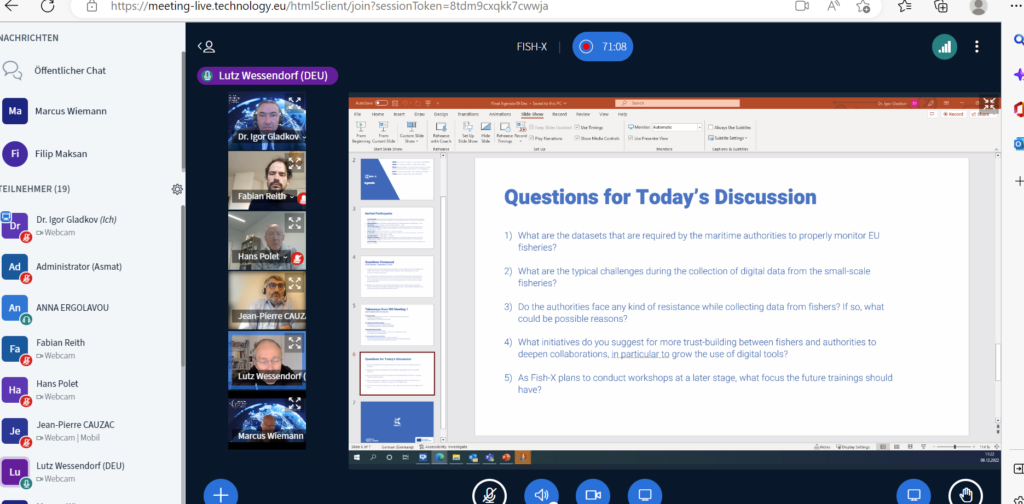
FISH-X PROJECT: IMPROVING DIGITAL TOOLS FOR EU FISHERIES’ MONITORING AUTHORITIES
Dr. Igor Gladkov and Marcus Wiemann, Fish-X Project Coordinators from EU Tech Chamber, welcomed the participants and moderated the meeting. EU Tech Chamber plans to organise three working group meetings every year like this one with the consortium partners and key stakeholders from EU and MS maritime authorities throughout the journey of Fish-X Project.
Dr. Fabian Reith, Fish-X Project Coordinator from TransMarTech, shared that the consortium partners believe in fostering sustainable fisheries and marine biodiversity by driving digital innovation and developing accessible technologies to empower small-scale fisheries. Fish-X is a 3-year project of 6 million euros, funded by the EU Horizon Europe Programme, being implemented by the seven European organisations, called consortium partners including TransMarTech Schleswig-Holstein (TMT, Germany), EU Tech Chamber (EUTECH, Germany), Collecte Localisation Satellites (CLS, France), North.io (Germany), Sciaena (Portugal), OURZ (Germany), and WWF EPO (Belgium), and the focus areas of the project are small and recreational fisheries at Mediterranean, Atlantic, and Baltic coasts.
During the Q/A session, the discussion revolved around the following five questions: (1) What are the datasets that are required by the maritime authorities to properly monitor EU fisheries? (2) What are the typical challenges during the collection of digital data from the small-scale fisheries? (3) Do the authorities face any kind of resistance while collecting data from fishers? If so, what could be possible reasons? (4) What initiatives do you suggest for more trust-building between fishers and authorities to deepen collaborations, in particular to grow the use of digital tools? (5) As Fish-X plans to conduct workshops at a later stage, what focus the future trainings should have?
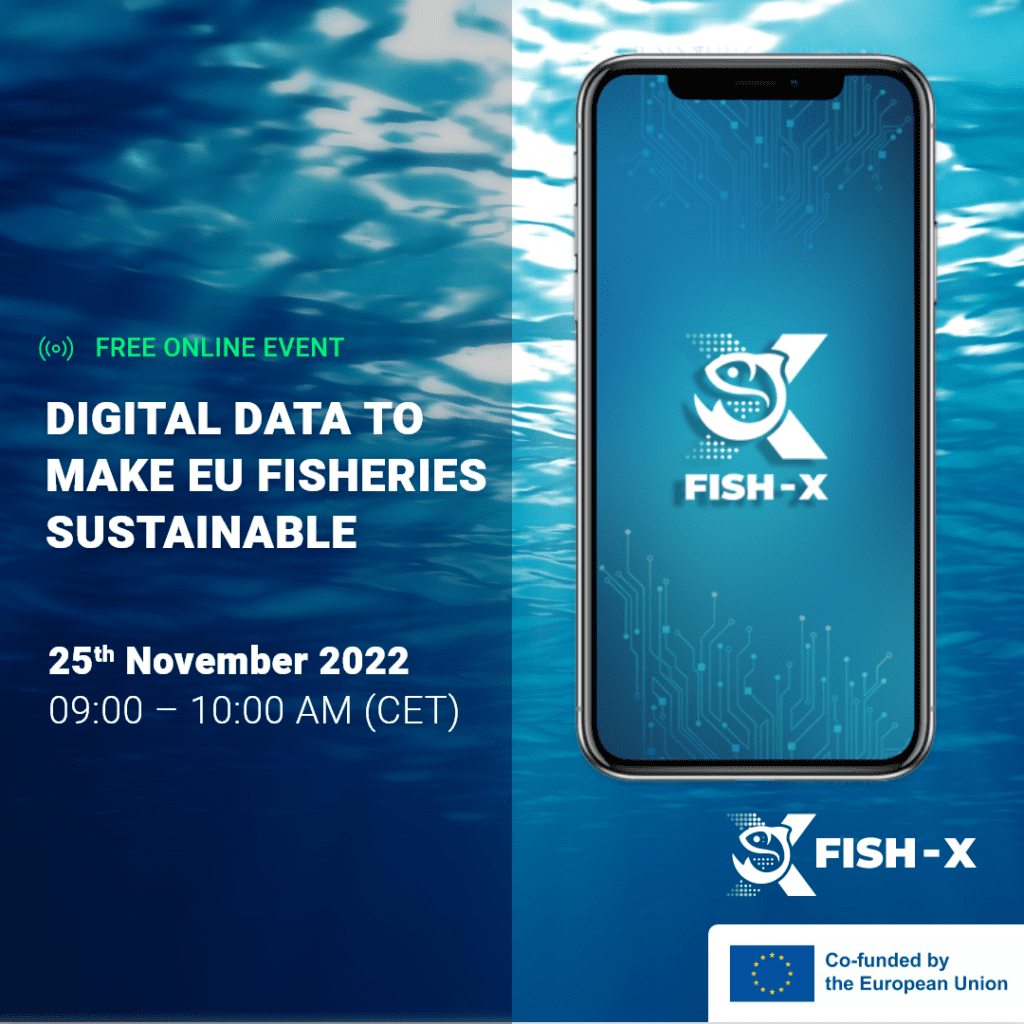
FISH-X PROJECT: DIGITAL DATA TO MAKE EU FISHERIES SUSTAINABLE
Dr. Igor Gladkov, Fish-X Communication Manager, along with Marcus Wiemann, Fish-X Project Officer, from EU Tech Chamber, moderated the webinar and welcomed the participants. EU Tech Chamber plans to organise a series of webinars like this one along with the Fish-X consortium partners for key stakeholders and interested participants throughout the journey of the project.
The keynote speaker, Yassine Atter, Solutions Manager at CLS, briefed about the concept of electronic reporting in the fishing industry which has already been deployed on some fishing vessels. During his presentation, he also demonstrated a software solution, which has been developed by CLS, to show participants a real example that how such system works and can be implemented. There was another keynote speaker, Max Rüther, who is the Project Manager at followfood, which is a food company from Germany. followfood is a leader in transparent and sustainable food production and its goals are saving fish stocks and the ocean by changing role of suppliers and brands and providing the most ecological products possible. They are the first brand with 100% sustainable fish products. Transparency is the main pillar at followfood and they invented the first tracking code in the food sector for their fish and agri products. Every customer can trace where the product comes from and how it is produced.
Jean-Pierre Cauzac, Bid Manager at CLS, moderated the Q/A session. While answering the questions, speakers emphasised that intermediaries could highlight the role of fishermen and supply chain process to improve the relationship between consumers and fishermen. For digitalisation of fishing gears, missing fishing gears should be reported or declared. There is a standard Flux, used by DG Mare, in the fishing industry to process the data.
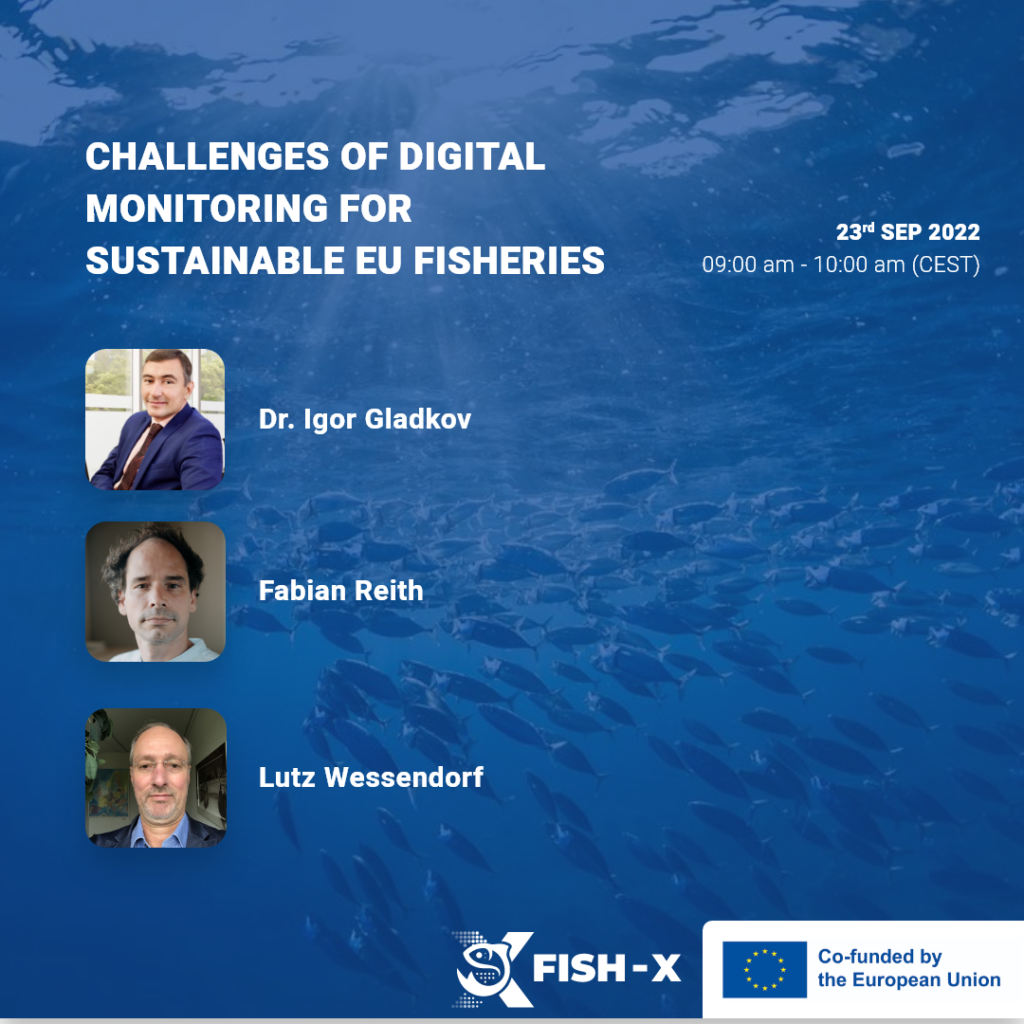
FISH-X: CHALLENGES OF DIGITAL MONITORING FOR SUSTAINABLE EU FISHERIES
The first working group meeting of FISH-X Project was held on September 23, 2022, on the topic of ‘Challenges of Digital Monitoring for Sustainable EU Fisheries’. Marcus Wiemann and Dr. Igor Gladkov, Fish-X Project Coordinators from EU Tech Chamber, moderated the meeting.
To introduce the debate, Lutz Wessendorf, Head of the Fisheries Management and Fisheries Industry Department, Federal Office for Agriculture and Food (BLE, Germany) held a keynote speech on ‘Digital Monitoring in Germany’. Afterwards, the participants engaged in a fruitful discussion regarding the best practices for digital monitoring systems to collaborate with the EU fisheries and other authorities.
During the Q/A session, the discussion revolved around the following three questions: (1) The EU fisheries is confronted by several challenges. Can you explain the top 3 challenges and needs of EU fisheries in your respective waters and your ways to approach them, so to transition towards sustainability? (2) For management and traceability collection, analysis and handling of data is becoming more and more important. What approaches are you pursuing in your respective countries and are there already digitization systems in practice allowing possibility for interoperability amongst EU Member States? (3) Based on your experiences, how familiar and skilled is the fish industry, public and private sector, to professionally engage in digitisation programmes? In case available, would you have some best practices to approach and involve them?
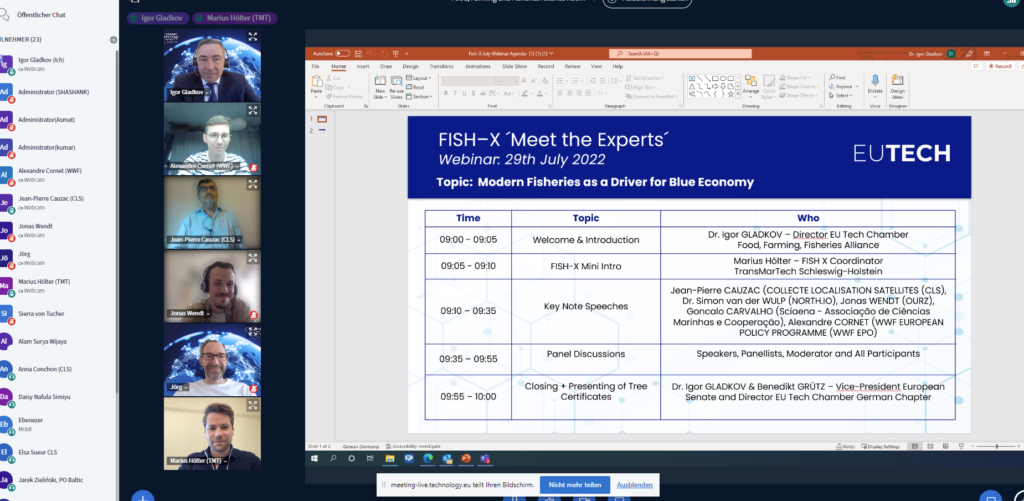
FISH – X PROJECT: MODERN FISHERIES AS A DRIVER FOR BLUE ECONOMY
Dr. Igor Gladkov, Fish-X Project Coordinator from EU Tech Chamber, moderated the webinar and briefed about the Fish-X Project as a technology and open-source project, initiated and supported by EU Horizon Europe Programme, which aims at making the EU fishery industry sustainable. EU Tech Chamber plans to organise a series of webinars and events like this one along with the consortium partners and key stakeholders.
TransMarTech, being the project coordinator, primarily aims at developing a central data platform namely Fish-X Dataspace to monitor fishing activities across the European region. CLS has been tasked to develop an online insight platform, using Artificial Intelligence and Big Data Technologies, with simple user interface and based on marine charts to evaluate the fishing patterns in different seasons and years and host the fisheries data. While North.io is going to develop an IT infrastructure to store the data while maintaining the security and privacy of the datasets that will help entities to make informed decisions. It will facilitate the monitoring, control systems, and fish product traceability. Creating a traceability platform for small-scale fisheries is the responsibility of OURZ that will help identify the data, collect and verify it, and make it usable for the stakeholders to draw analysis. On the other hand, four WWF offices (WWF Adria and Portugal at field level, WWF Mediterranean Marine Initiative at regional level, and WWF European Policy Office at EU level) are going to develop use cases from the field work in cooperation with small-scale fisheries and authorities that will be used for stakeholder engagement, policy analysis, and advocacy. While Sciaena will be doing the community engagement with small-scale fishing communities and help them with possible technical barriers to adoption.
While answering the questions, it was said that the Fish-X Project will help upgrade and improve the EU regulations and the same datasets will be used for the project which are used for current fisheries monitoring.
Download Past Events Presentations
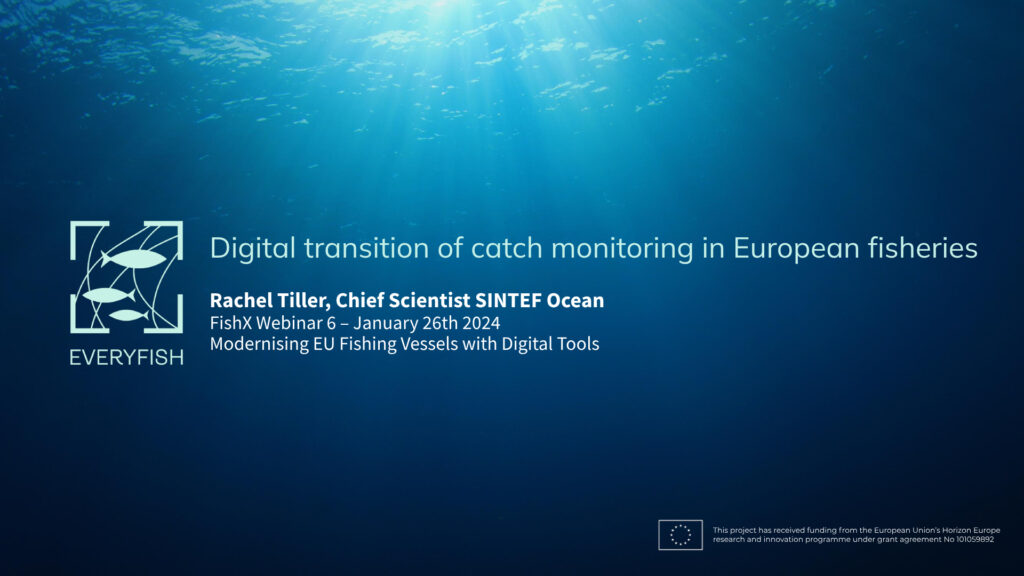
Digital transition of catch monitoring in European fisheries
Rachel Tiller
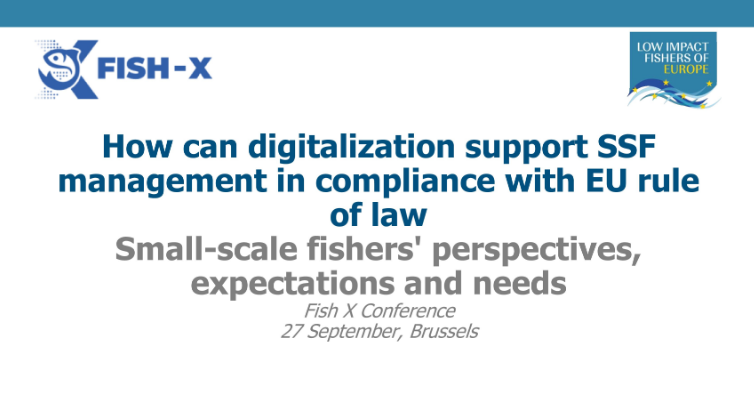
Small-scale fishers' perspectives, expectations, and needs
Marta Cavallé
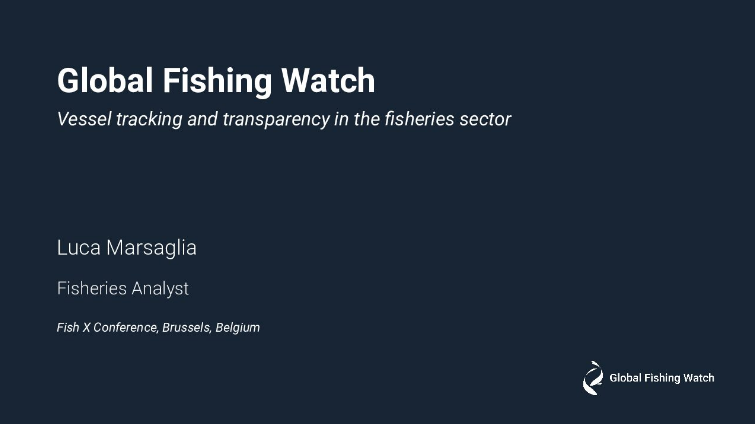
Vessel tracking and transparency in the fisheries sector
Luca Marsaglia
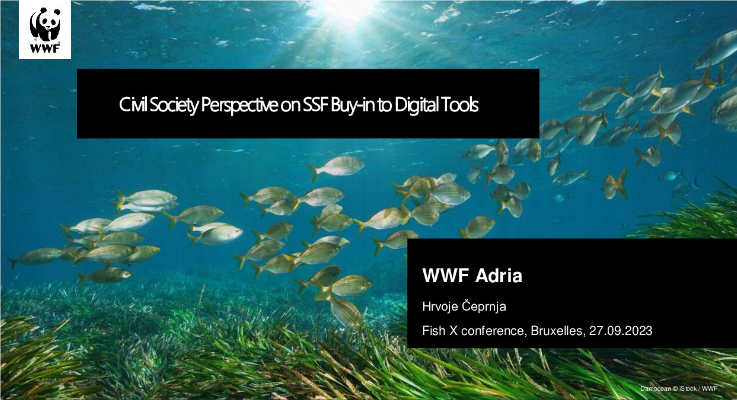
Civil Society Perspective on SSF Buy-in to Digital Tools
Hrvoje Ceprnja
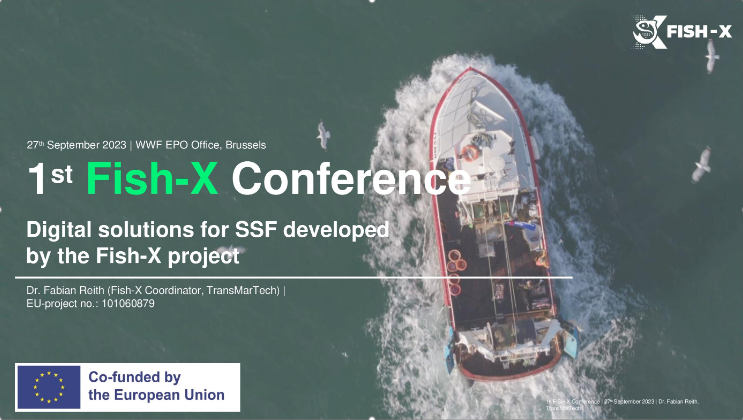
Digital solutions for SSF developed by Fish-X Project
Dr. Fabian Reith
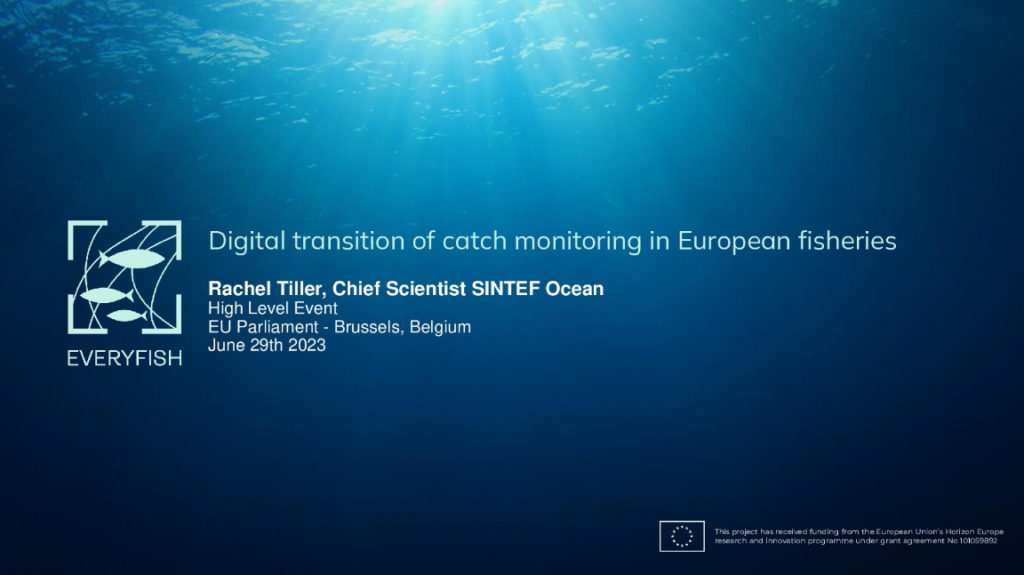
Digital transition of catch monitoring in European fisheries
Rachel Tiller
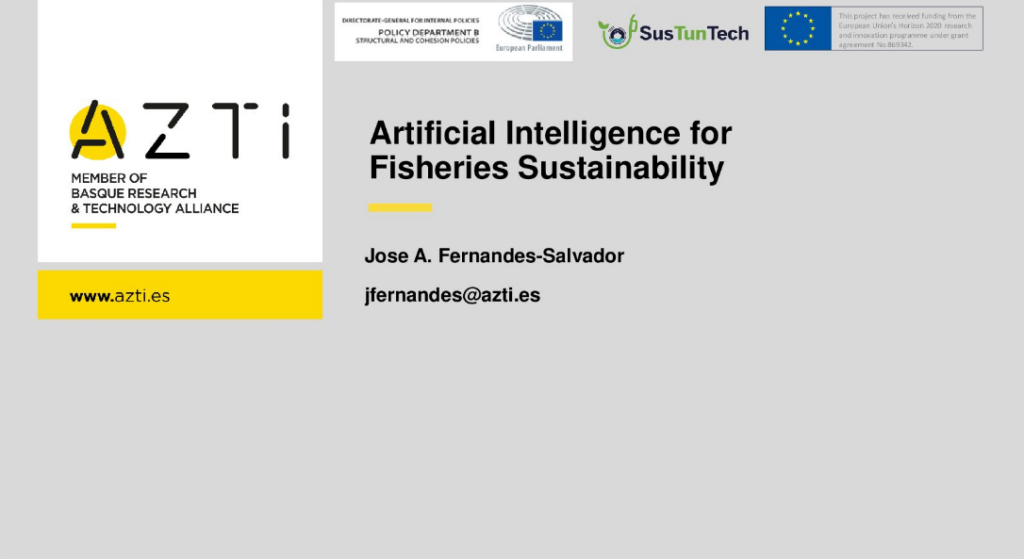
Artificial Intelligence for Fisheries Sustainability
Jose Fernandes
